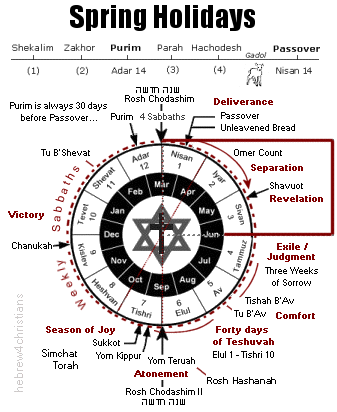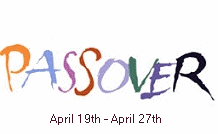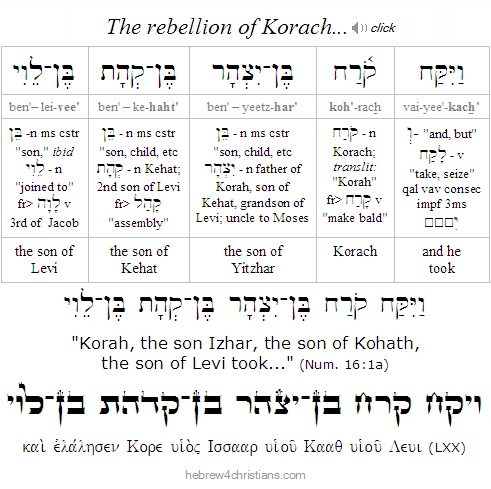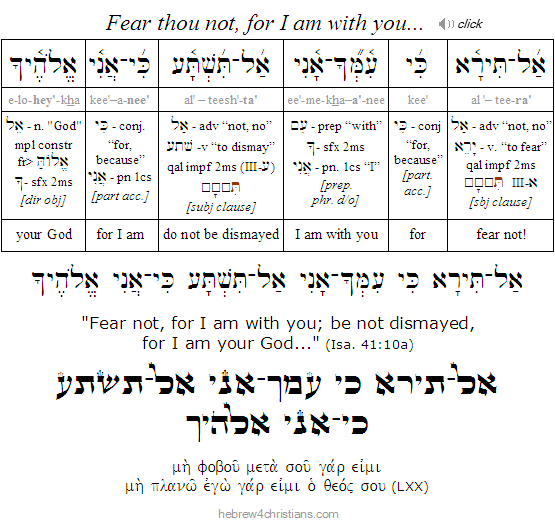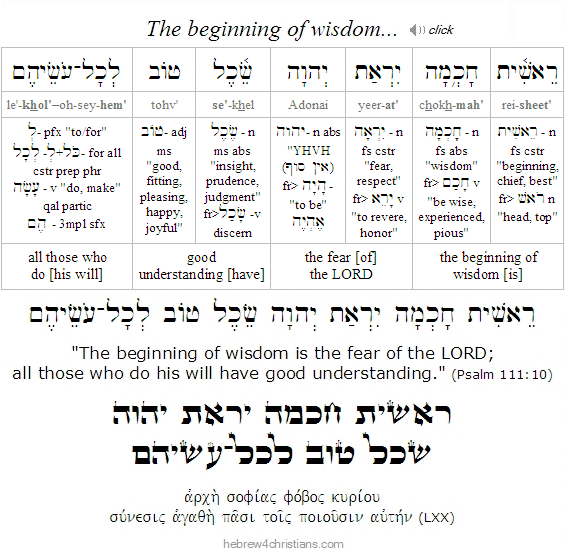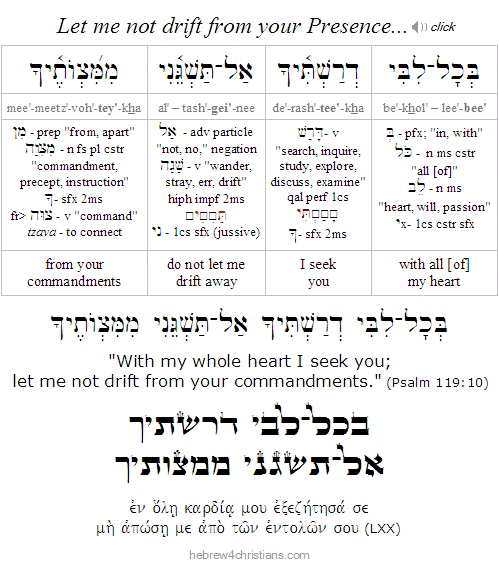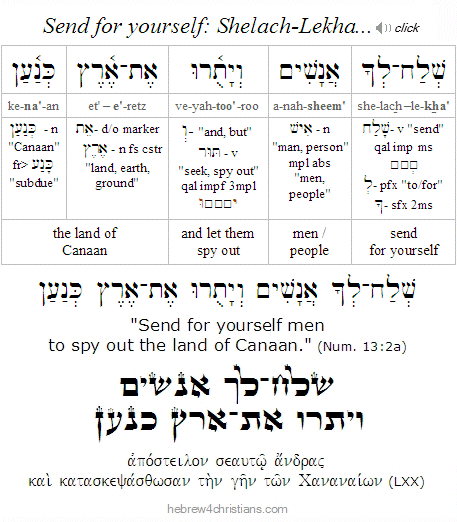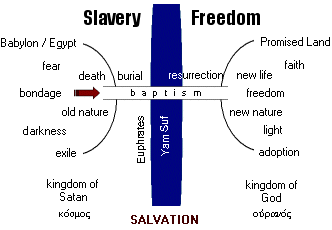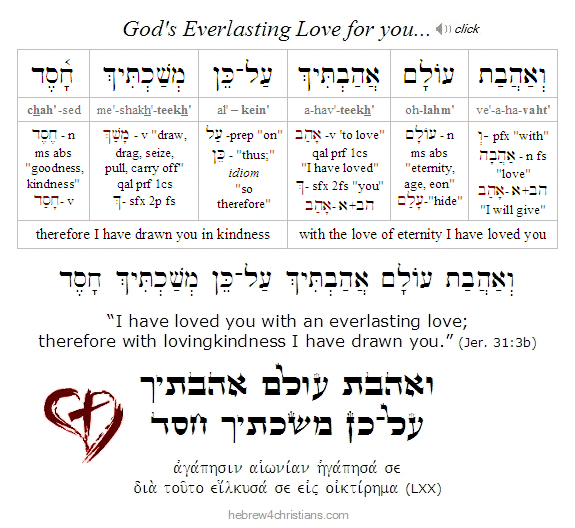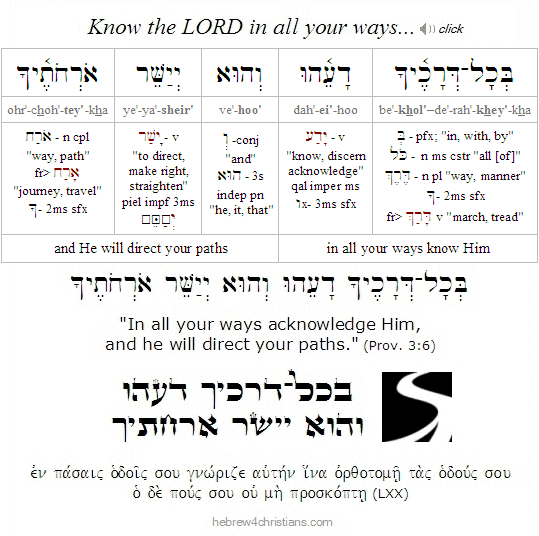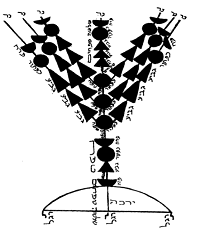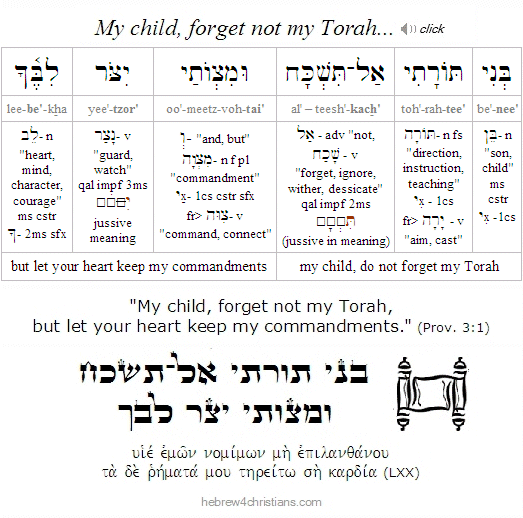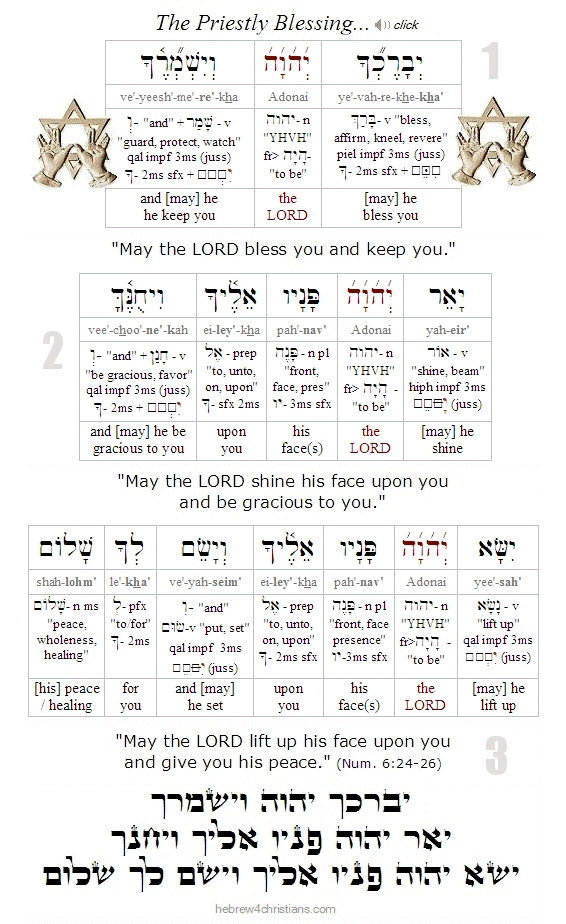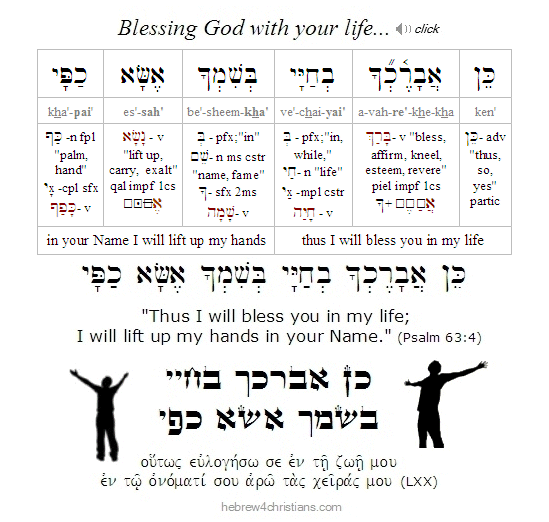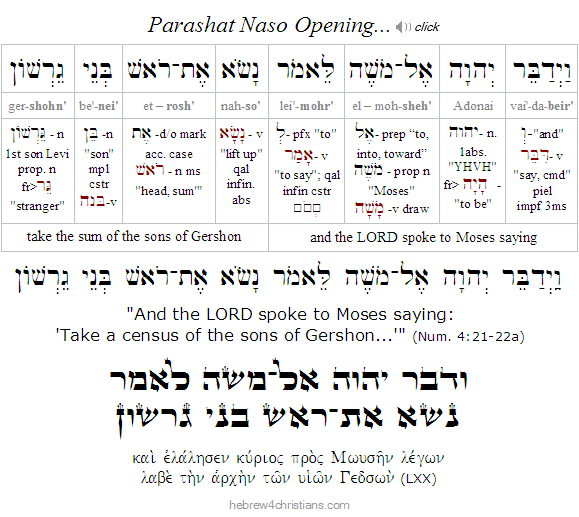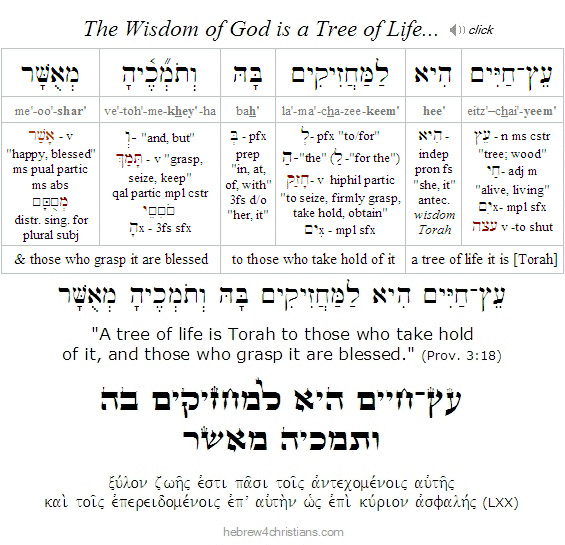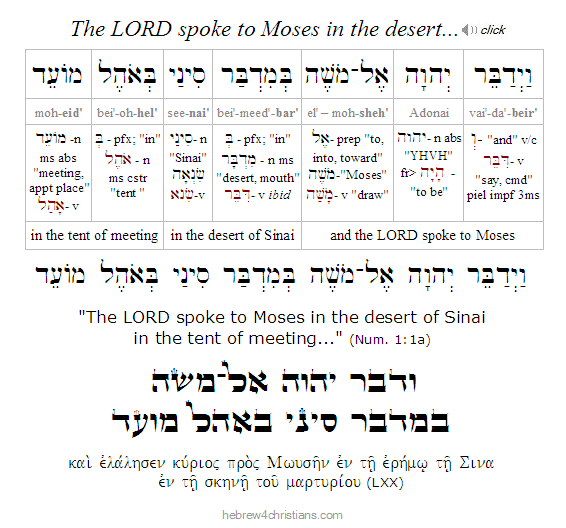|
Jewish Holiday Calendar
For June 2019 site updates, please scroll past this entry....
Spring is the start of the Biblical Year and is marked by two of the Shelosh Regalim (three annual pilgrimage festivals): Pesach (Passover) and Shavuot (Pentecost). The holiday of Shavuot is held seven weeks (or fifty days) following the morning after Pesach.
The Spring Holidays:
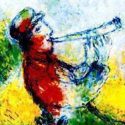
The spring holidays provide a portrait of the death, burial, and resurrection of the Messiah: Yeshua was crucified on erev Pesach, buried during Chag Hamotzi, and was resurrected on Yom Habikkurim (Firstfruits). Shavuot (i.e., the feast of Pentecost) was the day the Ruach HaKodesh (Holy Spirit) fell on believers in fulfillment of the promise given by our Lord.
Note that in accordance with tradition, the following holiday dates begin at sundown:
- Month of Nisan (Fri. April 5th [eve] - Sat. May 4th [day])
- Biblical New Year's Day: Rosh Chodashim [Fri. April 5th, Nisan 1, 5779]
- Four Sabbaths: Tazria (chodesh), Metzora (HaGadol), Passover (x2), Acharei Mot
- Shabbat HaChodesh - The Sabbath before (or on) Rosh Chodashim
- Rosh Chodashim - The start of the Biblical Year (Fri., April 5th,)
- Shabbat HaGadol - The Sabbath before Passover (Fri. April 12th)
- Bedikat Chametz - Removing leaven from your home before Passover
- Fast of the Firstborn - Fri., April 19th at sunrise (Nisan 14)
- Bi'ur Chametz - Burning leaven; Fri. April 19th in afternoon (Nisan 14)
- Passover - Fri. April 20th late afternoon until sundown Sat. April 27th
- Unleavened Bread - Fri. April 20th until sundown April 27th (Nisan 15-22)
- Firstfruits - Sun. April 21st at sundown (Nisan 17); Yeshua's Resurrection
- Counting the Omer - Sun., April 21st - Fri., June 7th
- Armenian Genocide Remembrance Day (April 24)
- Yom HaShoah - Wed. May 1st at sundown (Nisan 27)
- Rosh Chodesh Iyyar - Sat. May 4th (Nisan 30)
- Month of Iyyar (Sat. May 4th [eve] - Mon. June 3rd [day])
- Month of Sivan (Mon. June 3rd [eve] - Tues. July 2nd [day])
Note: Because this is a Jewish leap year, the holiday of Passover -- and particularly the Festival of Firstfruits -- will not occur near the traditional date of "Easter" or "Resurrection Sunday" as it is often called in the Gregorian calendar... For more information, see the Calendar Pages....
Dates for Passover 2019:
Free Seder Guide
June 2019 Updates
The Rebellion of Korah (פרשת קורח)
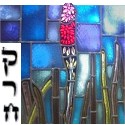
06.30.19 (Sivan 27, 5779) Last week's Torah portion (Shelach Lekha) told the tragic story about the "sin of the spies" and the divine decree that the generation rescued from Egypt was sentenced to die in the exile of the desert. In this week's portion (parashat Korach), the hard truth of their condition began to sink in, and the people bemoaned their fate and rebelled further by attempting to overthrow God's designated leadership and return to Egypt. This rebellion was instigated and organized by Moses' cousin Korach, who – along with a band of co-conspirators – was swiftly judged and put to death, thereby vindicating the Aaronic priesthood and Moses' leadership of Israel.
Korach was the cousin of Moses and a well-respected Kohathite who was honored to be one of the carriers of the Holy Ark. He was a wealthy man of influence - a nassi (prince) of the people. Despite all this privilege, however, Korach rationalized that he should be the head of the Kohathite clan (instead of his cousin Elzaphan), since he was the firstborn of Kohath's second son, whereas Elzaphan was not even a firstborn son. Indeed, because he felt slighted by Moses' choice, Korach went even further and brazenly questioned whether the office of the High Priest should not have been given to him – rather than to Aaron.
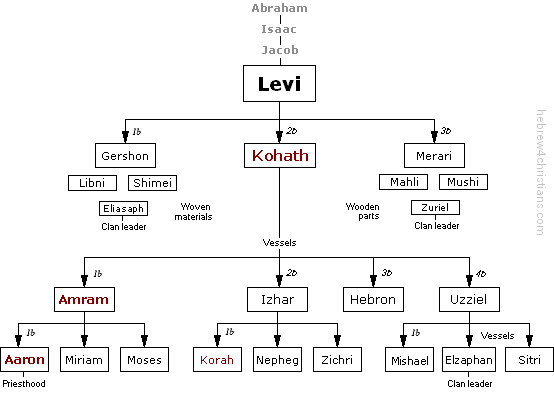 |
Korach's co-conspirators were two brothers named Dathan and Abiram from the tribe of Reuben, Israel's firstborn son. Together, they put together a force of 250 men to confront Moses and to challenge his exclusive claim to leadership: "You have gone too far! For all in the congregation are holy, every one of them, and the LORD is among them. Why then do you exalt yourselves above the assembly of the LORD?"
In response to their challenge, Moses proposed that Korach and his followers bring firepans to offer incense at the Tabernacle to determine whether they were indeed chosen to serve as priests. The following morning, when Korach and his 250 followers assembled at the gate of the Tabernacle to offer incense, God threatened to destroy them all instantly. Moses begged God not to destroy all the people, but only the rebels. He then warned the congregation to stand clear of the dwellings of Korach, Dathan, and Abiram. The earth then opened up and swallowed them alive, and a fire consumed the 250 men who illegitimately offered the incense...
Korach's rebellion introduced outright mutiny and chaos within the leadership of the camp that brought swift and terrible rebuke from the LORD. Nevertheless, the very next day the entire congregation of Israel audaciously began to accuse Moses and Aaron, saying: "You have killed the people of the Lord." When the people looked toward the Tabernacle, however, the Glory of the LORD appeared, where God descended to tell Moses and Aaron that he was going to destroy the Israelites for their treason. Despite Moses and Aaron's fervent intercession, however, a deadly plague broke out among the people. Moses then instructed Aaron to take his firepan with incense and to bring it in the midst of the congregation to make atonement for them. Aaron did so, "and he stood between the dead and the living; and the plague was stayed." The Torah tells us that 14,700 Israelites died because of the plague, not including the deaths of those involved in the rebellion of Korach.
As a final test to vindicate Aaron as God's chosen priest, each of the twelve tribal heads of Israel, as well as Aaron himself, were instructed to bring their staffs to Moses. Moses then inscribed their names on each staff and brought them into the sanctuary before the ark of the testimony. "And the staff of the man whom I choose shall sprout. Thus I will make to cease from me the grumblings of the people of Israel, which they grumble against you." The following day Moses went into the Tabernacle and "behold, the staff of Aaron for the house of Levi had sprouted and put forth buds and produced blossoms, and it bore ripe almonds." He then brought out all the staffs and gave them back to each of the tribal leaders. God then told Moses to return Aaron's staff to the Tabernacle as a testimony for generations to come.
Note: My kids came down with a virus of some kind last week, and now I am sick too. Please pray for our healing friends. I hope to add some additional audios this week but presently do not feel well enough to do them. Thank you, chaverim!
Yehoshua and Yeshua...

06.30.19 (Sivan 27, 5779) Before sending out the leaders of the tribes to spy out the land, Moses renamed his trusted servant Hoshea (הוֹשֵׁעַ) to Yehoshua (יְהוֹשֻׁעַ), appending the letter Yod (י) to make his name begin with a divine prefixive (יָהּ־). The Talmud (Sotah 34b) states that Moses foresaw the treachery and faithlessness of the spies and appended the Yod to remind Hoshea that YHVH (יהוה) must come first. This renaming of Hoshea, however, was certainly prophetic, since Joshua was chosen to be the successor of Moses who would finally lead the people into the promised land. Notice that the name Yehoshua (i.e., Joshua) and Yeshua (i.e., Jesus) come from the same root (i.e., yasha: ישׁע) meaning "salvation" or deliverance (in the Greek LXX, Joshua is spelled Ιησους, the same spelling for Jesus in the New Testament). Indeed, in the Book of Nehemiah, Yehoshua is explicitly called Yeshua (יֵשׁוּעַ), the name often transliterated as "Jesus" (Neh. 8:17).
Of course there are a number of fascinating similarities between Joshua and Jesus given in the Torah. For example, Joshua was a descendent of Joseph from Ephraim (lit., "double fruit"), and Yeshua came as Messiah ben Yosef, the "son of Joseph" who would come from Bethlehem of Ephrata (אֶפְרָתָה), a term that also means "fruifulness." Joshua was Moses' faithful companion at Sinai (Exod. 24:13) and overseer of the "Tent of Meeting" (אהל מועד), taking every opportunity to be near God's presence (Exod. 33:11). He was a capable commander of the armies of Israel who regularly routed the enemy in battle (Exod. 17:9, etc.). Joshua was truly humble and of impeccable moral character, a true servant of Israel filled with Holy Spirit of God (Num. 27:18). Therefore both Joshua and Yeshua loved God's house (Exod. 33:11; Luke 2:49), both were faithful leaders of Israel (Deut. 1:37-38; Matt. 2:6); and both were directly ordained by God. Moreover, Joshua was tested and found steadfast in his faith (Num. 32:12); he was willing to be "despised and rejected of men" rather than appease the mob, just as was Yeshua.
For more on this, see: "Joshua and Jesus: Further thoughts on Shelach Lekha."
 |
Contentment's Great Gain...

06.28.19 (Sivan 25, 5779) Friends, let us ask the LORD to give us hearts that are full of godly contentment, which is "of great gain" (1 Tim. 6:6). May we be walking in true spirituality (רוּחָנִיּוּת) - in the power of the Holy Spirit (רוּחַ הַקּדֶש) - by practicing emotional honesty with ourselves and with God (James 5:16). Trials and tribulations - the "squeezing of grapes" - are part of the walk of faith, but we are invited to come "boldly" before the Throne of Grace (παρρησίας τῷ θρόνῳ τῆς χάριτος) to find help for our lives (Heb. 4:16). Note that the word translated "boldly" in this verse (παρρησίας) means that we can speak honestly and freely to God from the center of the chaos of our hearts -- without fear or shame. We don't need to conceal ourselves from the Divine Light, since this is the very Light that overcomes the hidden darkness within us. Those who trust that God is in complete control of their lives are set free from the terrible burdens of fear and anger. Abiding in the truth of ahavah shlemah (אַהֲבָה שְׁלֵמָה, God's "perfect love") means that you can let go...
יֵצֶר סָמוּךְ תִּצּר שָׁלוֹם שָׁלוֹם כִּי בְךָ בָּטוּחַ
בִּטְחוּ בַיהוָה עֲדֵי־עַד כִּי בְּיָהּ יְהוָה צוּר עוֹלָמִים
yei·tzer · sa·mookh · tee·tzor · shah·lom · shah·lom · kee · ve·khah · ba·too·ack
beet·choo · vadonai · a·dey-ad · kee · be·Yah · Adonai · tzoor · oh·lah·meem

You will keep him in perfect peace whose mind is stayed on you, for he trusts in you.
Trust in the LORD forever, for Yah the LORD is an everlasting rock.
(Isa. 26:3-4)

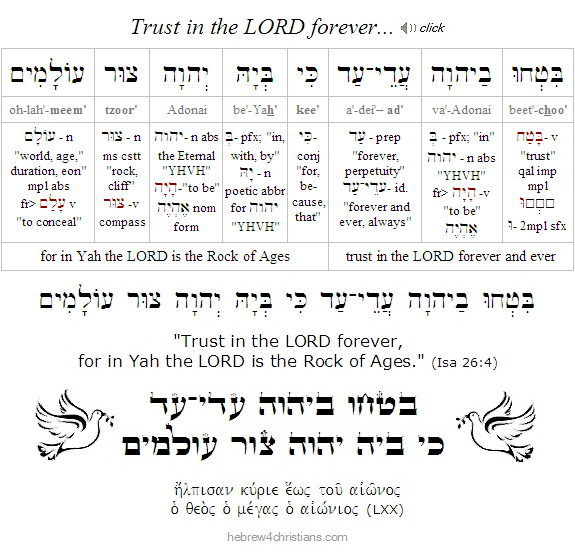
We live in a "two-tiered" reality. This world is not our home; we are "strangers" here. It is an affliction to wait for the LORD, a sort of "homesickness" of heart... The apostle Paul says our loneliness and alienation prepare for us an "eternal weight of glory" beyond all comparison, because we are not looking at what can be seen but at what cannot be seen. "For what can be seen is temporary, but what cannot be seen is eternal" (2 Cor. 4:17-18). Just as the "two-souled" man is unstable in all his ways, so the process of being "educated for eternity" means learning to focus our heart's passion and hope on the glory of heaven. "For where your treasure is, there will your heart be also."
God is our "Rock," a metaphor that implies that He is the immovable foundation and cornerstone of all reality. God is our strong refuge in the stormy changes we all face in this world. His Presence both grounds us and sustains our way. Nonetheless we walk by faith, not by sight, and often the sojourner in this world faces testing and even tribulation. We must perservere and endure. In his despair, Job once asked, "If a man dies, shall he live again? All the days of my warfare I will wait until my change comes" (Job 14:14).
Now more than ever: Choose to fight (ἀγωνίζομαι - "agonize," "struggle") another day. Do not yield to despair or give place to anxiety. Press on and keep fighting the "good fight" of faith (1 Tim. 6:12). You infinitely matter to heaven; your life has great value; you are significant and you are truly loved by our Heavenly Father... There is a "future and a hope" reserved for you (Jer. 29:11); there is "a white stone, and on that stone will be written a new name that no one can understand except the one who receives it" (Rev. 2:17). This promise is given to the "one who conquers" (Τῷ νικῶντι) because of the love and grace of our God. Indeed, by faith we are made "more than conquerors" (lit. "hyper conquerors," ὑπερνικῶμεν) through the Messiah and his love for us (Rom. 8:37).
In our struggle against the darkness, there is an end coming, so don't let your heart grow numb. Never give up hope. God has promised: "I will give you a new heart (לֵב חָדָשׁ), and a new spirit (רוּחַ חֲדָשָׁה) I will put within you. And I will remove the heart of stone (לֵב הָאֶבֶן) from your flesh and give you a heart of flesh" (Ezek. 36:26). Receive God's promise for your soul, since His healing love is what you really need...
 |
Beholding Promised Good...
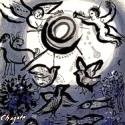
06.28.19 (Sivan 25, 5779) How we see is a spiritual decision... From our Torah portion this week (i.e., Shelach Lekha) we read: "See the land, what it is ... whether it be good or bad ... and strengthen yourselves" (Num. 13:18-20). Here note that right seeing – even the negative aspects of the land such as the presence of "giants" – can only be achieved by the courage derived from faith. When you see things that appear bad, you are to "strengthen yourselves," a Hebrew verb (i.e., וְהִתְחַזַּקְתֶּם) that means to intently decide to see the good despite the present veil of appearances. When we encounter things that are bad, we must refuse to be overwhelmed by carnal reasoning and fear by looking beyond the moment to behold a promised good (see 2 Cor. 4:18). Whether things appear to be good or bad, trust God is with you, in your midst; he will never leave nor forsake you...
New Audio Podcast:
Faith and Trust...
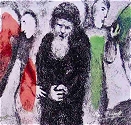
06.28.19 (Sivan 25, 5779) Since our Torah portion this week (i.e., Shelach Lekha) tells the tragic story of how the Exodus generation lost their inheritance by believing the faithless report of the spies, I thought it would be helpful to review the nature of faith so that we might guard ourselves from stumbling in a similar way. After all, concerning the tragic decree of God regarding the fate of Israelites in the desert (see Num. 14:21-35), the New Testament admonishes us to "fear lest any of you should likewise fail to attain the blessing of God's promise." In this new audio broadcast, I discuss what faith is and how we must learn to trust God for our inheritance... I hope it encourages you, chaverim. Please click the link(s) below to listen or download:
What We Value Most...
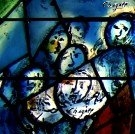
06.27.19 (Sivan 24, 5779) What we fear says a lot about us, since fear is closely linked to what we value and ultimately worship... The Spirit attests that all the world is lit up with the radiance of God our Savior: קָדוֹשׁ קָדוֹשׁ קָדוֹשׁ יְהוָה צְבָא֑וֹת מְלא כָל־הָאָרֶץ כְּבוֹדוֹ - "Holy, holy, holy, is the LORD of hosts: the whole earth is full of his glory" (Isa. 6:3). Fearing lesser things blinds us to the truth of Reality and glorifies the realm of darkness. The world system is based on slavery to such lesser gods and fears, but we are to walk in the awe of the LORD God Almighty alone, and the light of his reverence overcomes the fear of this world. As the Gerer Rebbe said: "If a man has fear of anything except the Creator, he is in some degree an idolater. For to fear is to offer worship to the thing feared, and this form of worship may be offered only to the LORD."
אֶת־יְהוָה אֱלהֶיךָ תִּירָא
וְאתוֹ תַעֲבד וּבִשְׁמוֹ תִּשָּׁבֵעַ
לא תֵלְכוּן אַחֲרֵי אֱלהִים אֲחֵרִים
מֵאֱלהֵי הָעַמִּים אֲשֶׁר סְבִיבוֹתֵיכֶם
כִּי אֵל קַנָּא יְהוָה אֱלהֶיךָ בְּקִרְבֶּךָ
et · Adonai · E·loh·hey·kha · tee·rah
ve·oh·toh · ta·a·vohd · oo·veesh·moh · tee·shah·vei·a'
loh · tei·le·khoon · a·kha·rei · e·loh·heem · a·chei·reem
me·e·loh·hei · ha·a·meem · a·sher · se·vee·voh·tey·khem
kee · el · ka·nah · Adonai · E·loh·hey·kha · be·keer·be·kha

"It is the LORD your God whom you shall fear.
Him you shall serve and by his name you shall swear.
You shall not go after other gods,
the gods of the peoples who are around you
for the LORD your God in your midst is a jealous God."
(Deut. 6:13-15)

The fear of the Lord, yirat Adonai, is reverent awe and honor that resembles the great trembling of love: mekudeshet li: "With this ring I do consecrate thee..." The Scriptures repeatedly state that this fear is reishit chochmah (רֵאשִׁית חָכְמָה) – the "beginning of wisdom" and the foundation of all true godliness and obedience.... Sin always entices us to fear the "lesser gods"; it seduces us to live in arrogance, pride, anger, envy, lust, despair, and so on. Sin expresses the opposite of godly reverence and seeks to justify cowardly indolence so that people learn to actually "love" and defend what enslaves them...
רֵאשִׁית חָכְמָה יִרְאַת יְהוָה
שֵׂכֶל טוֹב לְכָל־עשֵׂיהֶם
rei-sheet · khokh-mah · yeer-at · Adonai
sei-khel · tohv · le-khol - oh-sey-hem

"The beginning of wisdom is the fear of the LORD,
all those who do his will have good understanding."
(Psalm 111:10)

Fearing lesser gods is an affront to the glory and majesty of our Savior. We are commanded to be full of courage given by God's own spirit: It is the Lord who goes before you. He will be with you; he will not leave you or forsake you. Do not fear or be dismayed" (Deut. 31:8). "Have I not commanded you? Be strong and courageous. Do not be frightened, and do not be dismayed -- for the Lord your God is with you wherever you go!" (Josh. 1:9).
The fear of the LORD expresses the power of faith to repel the schemes and designs of the devil. Then Jesus said to him, "Be gone, Satan! For it is written, 'You shall worship the Lord your God and him only shall you serve'" (Matt. 4:10). "Submit yourselves therefore to God. Resist the devil, and he will flee from you" (James 4:7). Ultimately, the fear of the LORD is a great gift, the underlying motive of all true teshuvah (repentance).
New Audio Podcast:
Faith and Courage...
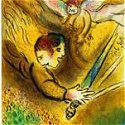
06.27.19 (Sivan 24, 5779) Shalom Chaverim! In our Torah portion this week (i.e., Shelach) we read how the spies faithlessly judged that the people were not strong enough to take possession of the promised land. They said, "we seemed to ourselves like grasshoppers, and so we seemed to them" (Num. 13:33). Here the sages note the subtle - yet profound - connection between how we see ourselves and how we imagine that others see us. This sort of "projection" is common enough, and sometimes we even make the mistake of thinking that God sees us the way we feel about ourselves.... In this shorter broadcast, I hope to encourage you to keep faith in the LORD God of Israel's love and blessing for you, even if the present hour may seem dark, confusing, or overwhelming...
The Fear of the LORD...
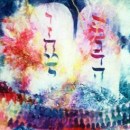
06.27.19 (Sivan 24, 5779) When the people heard the Voice of the LORD (קוֹל יְהוָה) thunder at Sinai, they drew back in fear and appealed to Moses to be their mediator: "You speak with us and we will listen, but let not God speak with us, for we might die" (Exod. 20:19). Moses paradoxically replied, "Do not fear, for God came in this way to test you and in order that His fear should remain before you, so that you do not sin" (Exod. 20:20). The point of fearing God, then, is to keep us from what separates us from the love of God. The Kotzker Rebbe astutely commented: "When Moses exhorted the people not to be afraid, he meant that the fear "for we might die" was not what God wants from us. Rather, God desires that the awe and wonder of Him should remain before you so that you do not entertain or accept the practice of sin. That is the only true fear of heaven." The "fear of the LORD" is that we might lose sight of what we really need for life... Sin entices us to fear the "lesser gods"; it seduces us to live in arrogance, pride, anger, envy, lust, despair, and so on. A sinful attitude expresses the opposite of godly reverence and seeks to justify its lesser fears so that soul begins to "love" and defend what enslaves it... Indeed, this is what the "fear of the LORD" (יִרְאַת יְהוָה) most radically means: God's own passion that we would not lose sight of our great need for his healing love.
יִרְאַת יְהוָה שְׂנאת רָע
גֵּאָה וְגָאוֹן וְדֶרֶךְ רָע
yeer·at · Adonai · se·noht · ra'
gei'ah · ve'gah·ohn · ve'de·rekh · ra'

"The fear of the LORD is hatred of evil -
pride and boasting and the evil way..."
(Prov. 8:13)
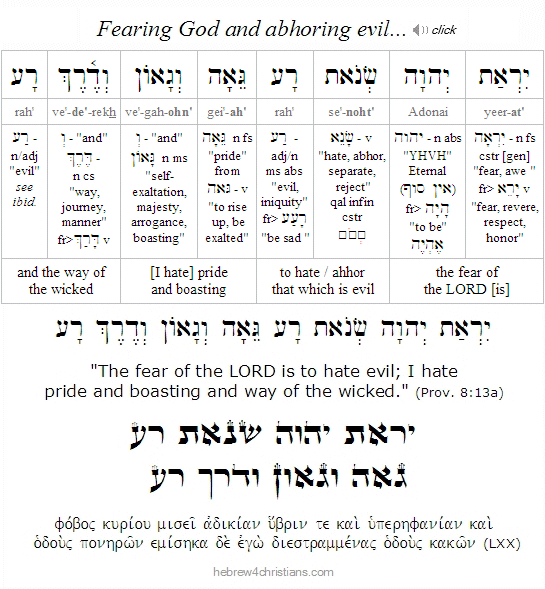
As I've mentioned before, the Hebrew word for "seeing" (ra'ah) is related to the word for "fear" (yirah), suggesting that when we really see life as it is, we will be filled with wonder and awe over the glory of it all. Every bush will be aflame with the Presence of God and the ground we walk upon shall suddenly be perceived as holy (Exod. 3:2-5). Nothing will seem small, trivial, or insignificant. It is in this sense that we are to serve the LORD with "fear and trembling" (φόβοv καὶ τρόμοv), that is, with an inner awareness of the sanctity and sacredness of life itself (Phil. 2:12-13). When we see life as it is, with the "eyes of the heart" (Eph. 1:18), we will be filled with wonder and awe over the glory of it all. "Fearing" (יִרְאָה) and "seeing" (רָאָה) will be linked and unified.
The Seal of God is Truth...

06.26.19 (Sivan 23, 5779) The sages state "the seal of God is truth," by which they mean that reality bears its own inviolable witness. Spiritual truth is ultimately personal, since it is "lived truth," and therefore it is part of the inner will of the person. A true person's life will agree with his or her words; the inner and the outer will correspond and align. The apostle Paul wrote that God's firm foundation (i.e., yesod: יְסוֹד) bears this distinctive seal: on one side is imprinted, יוֹדֵעַ יְהוָה אֵת אֲשֶׁר־לוֹ - "The LORD knows those who are his," and on the other side, יָסוּר מֵעָוֶל כָּל הַקּוֹרֵא בְּשֵׁם יהוה - "Let everyone who names the Name of the LORD depart from evil" (2 Tim 2:19; citing Num. 16:5 and Luke 13:27 respectively). People may say one thing and believe another, but ultimately no one can "fake" the truth: God bears witness to what is real, as it says, "All things are naked and exposed to the eyes of Him to whom we must give account" (Heb. 4:13). The LORD knows who are his own, and he knows those who are impostors. As Yeshua said: "My sheep hear my voice, and I know them (וַאֲנִי יוֹדֵעַ אתָן), and they follow me" (John 10:27).
We can test whether our faith is genuine by first asking whether we are trusting Yeshua to be our only means of salvation (and sanctification) -- believing that he alone is our means of finding the righteousness of God (צִדְקַת אֱלהִים), -- and then honestly examining our actions to see whether we evidence the love of God (John 14:1; 15:9-10; 1 John 4:7-8). "Whoever says he lives in Him ought to walk in the same way in which he walked" (1 John 2:6).
The Hebrew word for truth is emet (אֱמֶת), a word that consists of the first, middle, and last letter of the Hebrew Aleph-bet, indicating that truth encompasses all things and endures from the beginning (א) to the end (ת). But notice that if we remove the letter Aleph from the word, we are left with מֵת, (dead), the opposite of חַיִּים (life). The letter Aleph is the ineffable letter that represents oneness and God's preeminent glory. Therefore, if we attempt to ignore or suppress God in our understanding of truth, we end up with death...
Yeshua our Messiah is called the Aleph and the Tav (הָאָלֶף וְהַתָּו), "the first and the last" (הָרִאשׁוֹן וְהָאַחֲרוֹן). These are divine titles that belong exclusively to YHVH (Isa. 41:4, 44:6, 48:12; Rev. 1:1,17-18; 22:13). Pilate's famous question, "What is truth?" is a category mistake, since truth is not about "what" but about "Who." That is, truth is not something objective and static, a thing to be known and studied from a distance. No. Truth is up-close and personal.... You don't judge the truth, but the truth will reveal what is within you... "Because of indifference, one dies before one actually dies" (Elie Weisel). May the LORD help each of us to evidence the "seal of truth" in our lives. Amen.
Note: For more on this subject, see the article, "What is Truth?"
 |
Whisper of the Spirit...
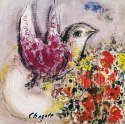
06.26.19 (Sivan 23, 5779) The Spirit speaks to the heart using a "still and gentle whisper" which will be nearly inaudible unless we "make room within ourselves" to listen... If we entertain negative thoughts or messages, however, our spiritual receptivity will be impaired or damaged. For example, if we listen to the news of this world and believe its messages of fear or anger, we will squelch the whispering of the Holy Spirit. The Name YHVH (יהוה) means "God is Present" and near, as close as your heart. The LORD is near, even when you might feel lost and far away... We attune ourselves to hear kol demamah dakkah (קוֹל דְּמָמָה דַקָּה), God's "still, small voice," only when we are quieted, not when we are listening to the false narratives and nonsense of this world. When the world casts its spell to entice you to lust or be afraid, resolutely affirm to yourself what is real, true, and abiding... There is peace for you: "In returning and rest you shall be saved; in quietness and in trust shall be your strength" (Isa. 30:15).
"Where there is no prophetic vision the people cast off restraint, but the one who keeps Torah is made happy" (Prov. 28:19). Without hope, we begin to die inside… We keep our focus by consciously recalling the goal, purpose, and true end of life. We find the will to live as we immerse ourselves in the truth revealed by the Hebrew prophets, and of course in the teaching (i.e., Torah) of Yeshua our beloved LORD and Savior. "You have said, "Seek my face." My heart says to you, "Your face, LORD, do I seek" (Psalm 27:8), "With my whole heart I seek you; let me not wander from your commandments" (Psalm 119:10). "Seek the LORD and his strength; seek his presence at all times" (Psalm 105:4).
בְּכָל־לִבִּי דְרַשְׁתִּיךָ
אַל־תַּשְׁגֵּנִי מִמִּצְוֹתֶיךָ
be·khol-lee·bee · de·rash·tee-kha
al-tash·gei·nee · mee-meetz-voh-tey-kha

"With my whole heart I seek you;
let me not drift from your commandments."
(Psalm 119:10)

Testing of Faith (מבחן האמונה)

[ The following concerns this week's Torah reading, parashat Shelach Lekha. Please read the Torah portion to "find your place" here. ]
06.26.19 (Sivan 23, 5779) From our Torah this week (Shelach Lekha) we read about the report of the spies: "They (the spies) returned... and brought word and showed them the land's bounty. And they said, "We came to the land to which you sent us. It flows with milk and honey (זָבַת חָלָב וּדְבַשׁ), and look, here is its fruit. Nevertheless the people who inhabit the land are powerful; the cities are greatly fortified, and we also saw the (giant) people of Anak there... We are unable to go up against the people there, for they are stronger than we are ... and moreover the land itself consumes its inhabitants" (Num. 13:25-32). The Kotzer rebbe asked, "Did the spies lie? Did they invent words that were untrue? Behold, they spoke as they saw it, so how did they sin?" Yet not everything that is not a lie is truth: you may have all the facts "correct" and yet still speak untruth. Truth is therefore something more than the description of appearances (correspondence) since what appears is interpreted by underlying convictions and assumptions that contextualize simple perception... For example, future tense propositions (e.g., "it will not rain tomorrow"), counterfactual conditionals ("if it had not rained yesterday then we would have gone to the zoo"), probabilistic predictions ("there is a 50% chance it will rain tomorrow), etc., are are based on inferences from what is observed or seen to what is not seen, and therefore they are all grounded in faith that the future will resemble the past, that the laws of nature are constant, that measurement is possible, and so on. Language about possibilities, probabilities, expectations, outcomes, and so on all turn on the question of faith. Our Torah portion this week illustrates the responsibility we have to trust in the promises of God, regardless of phenomenological appearances... When it comes to trusting in an unseen Good, we must believe in order to see, not the other way around.
But what about the trouble, testing, pain, hardship in our lives? How do we deal with these without losing heart? Only God can help us, friend... In this life, where our "outer man perishes" we will experience the "existential pathos" of the life of faith. That is the test. We may feel abandoned by God, or forgotten, or of complete insignificance, or sinful, vile, hopeless confused, and so on, and yet the heart of faith cries out: "Though he slay me, yet will I trust in him" (Job 13:15). Faith is able to see beyond the temporal to the eternal... It finds comfort in God's blessing to endure the ambiguities of this world. May the LORD God Israel, Yeshua our Messiah, strengthen us all. Amen.
 |
New Audio Podcast:
The Power of Change...

06.26.19 (Sivan 23, 5779) In addition to the longer "Shavuah Tov" audio discussions of the weekly Torah reading, I am considering making some shorter audio messages (perhaps just 5 minutes in length) to share here on occasion. Please check out the linked sample below and let me know if you would like me to do this, chaverim. Thank you.pedullabass3@usfamily.net
Eyes of the heart (עיניים של הלב)

[ The following concerns this week's Torah reading, parashat Shelach Lekha. Please read the Torah portion to "find your place" here. ]
06.25.19 (Sivan 22, 5779) "We walk by faith, not by sight." This is true for all people, since every soul lives by faith of some kind or another. Our Torah portion this week (i.e., Shelach) begins with the episode of the spies and concludes with the warning not to "spy after your heart and after your eyes" (Num. 15:39). The Torah mentions the heart first and then the eyes to indicate that the eyes follow the heart. We see as we believe with our heart: "According to your faith be it done unto you." When the spies said, "We are not able to go up (לא נוּכַל לַעֲלוֹת)... for they are stronger than us" (Num. 13:31), they revealed their unwillingness to believe in God's promise, or, to put it another way, they revealed their faith in God's inability to deliver on his word.... Indeed, the Hebrew word for "than us" (מִמֶּנּוּ) can also mean "than Him," suggesting that the spies believed that even God would be unable to uproot the Canaanites. According to their faith, so it was done; by believing that it was impossible, they lost the possibility of God's promise...
Faith sees the real possibility of truth's fulfillment and consequently refuses to yield to the artificiality of mere appearance. Indeed, appearances are often a test of our courage. We may never know how often a test was given and - just before victory would come - the heart grew faint and was lost to fear. "According to your faith be it done to you" is a spiritual principle that applies to everyone. In that sense, it is not that we have faith that matters (since every person has faith, of course), but whether our faith is grounded in the promises and power of the LORD God of Israel, or in something else....
אָמַרְתְּ לַיהוָה אֲדנָי אָתָּה
טוֹבָתִי בַּל־עָלֶיךָ
a·mart · la·do·nai: · A·do·nai · ah·tah
toh·vah·tee · bal - ah·ley·kha

"I say to the LORD, "You are my Lord;
I have no good apart from you."
(Psalm 16:2)

Hebrew Study Card
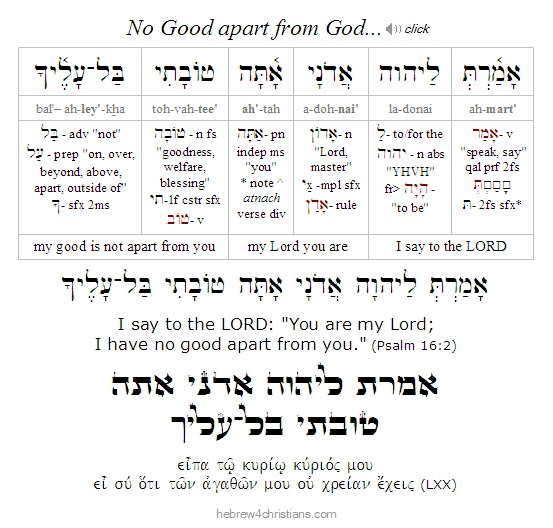
New Audio on Shelach Lekha...

06.24.19 (Sivan 21, 5779) I was able to complete a new "Shavuah Tov" audio broadcast for parashat Shelach Lekha late last night which is now ready for online listening or download (see the links below). In this audio discussion on the weekly Torah portion, I discuss issues of faith, courage, and finding meaning for your life in the will and love of God. Trusting in God's personal love for you presupposes that you are worthy to be loved and that there is a divine inheritance reserved for you. This gives you real courage to go take possession of the divine promise as its rightful heir... I hope you will find it encouraging, friends.
Parashat Shelech Lekha (פרשת שלח־לך)
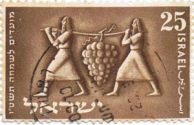
06.23.19 (Sivan 20, 5779) Shalom chaverim! Our Torah reading for this week, Shelach Lekha (שלח־לך), recounts how Moses sent twelve spies from the desert region of Kadesh into the land of Canaan to search it out and give a report of its condition. The spies returned 40 days later extolling the land, saying that was indeed fruitful and zevat chalav u'devash (זָבַת חָלָב וּדְבַשׁ), "flowing with milk and honey." However, ten of the spies also gave a discouraging report, indicating their lack of confidence that the people could conquer the land. Only Joshua (יְהוֹשֻׁעַ) and Caleb (כָּלֵב) kept faith in God's promise. Upon hearing the report of the ten spies, however, the people rebelled and cried out to return to Egypt. Angered by their lack of faith, God sought to destroy the people, but Moses interceded on their behalf. The LORD then decreed to lengthen the Israelites' wandering in the desert to 40 years -- one year for each day the spies were in the land -- until all of the faithless over the age of 20 would die in the desert, except for Joshua and Caleb, the two spies who kept faith with the LORD. After hearing the judgment of God, a group of remorseful Israelites decided to "repent" by taking matters into their own hands. Without either the "Ark of the Covenant of the LORD" or Moses' leadership, they presumptuously decided to storm a mountain on the border of land but were decisively routed by the Amalekites and Canaanites.
If last week's Torah might be called "sefer kvetch" (the book of complaint), this week's Torah reveals the fateful outcome... The people's lapse of faith in God's power serves as a profound and very sober warning, and indeed is a primary warning regarding the dreadful sin of unbelief in the New Testament (see Heb. 3:7-4:11). Indeed, Jewish tradition states that the decree that "none of the men who had seen my glorious Presence and my signs I performed in Egypt and in the desert will see the land that I swore to give to their fathers" (Num. 14:22-23) was given on the Ninth of Av (i.e., Tishah B'Av), and was prophetic of the destruction of the Temple and the worldwide exile of the people from the Promised Land. The sin of unbelief may rightly be regarded as the "unpardonable sin" of the Torah...
The tragedy of the sin at Kadesh ultimately has a happy resolution, however, since the LORD is never thwarted by man's sin and weaknesses. After the 38 years of exile were complete, Moses' faithful successor Joshua (יְהוֹשׁוּעַ) sent a second spying expedition to the promised land, though this time God led the spies to a prostitute named Rahab (רָחָב), a direct ancestor of Yeshua the Messiah, who later identified her faith in the LORD's victory by displaying the scarlet cord (חוּט הַשָּׁנִי) during the fall of Jericho (Joshua 2). Rahab was the (grand)mother of Boaz, who later married Ruth, the great grandmother of King David. May God likewise give us courage to walk in the power of His promises, even if our present circumstances seem daunting. May the LORD clothe each of us with the "spirit of David" to stand before all the giants of the land who defy the LORD and His power.
Note: I hope to get an new audio on parashat Shelech completed tonight sometime...
Assured by Love's Promise...

06.21.19 (Sivan 18, 5779) Regarding the assurance of our salvation Yeshua declared: "I tell you the solemn truth, the one who hears my message and believes in the One who sent me has (i.e., present active indicative) eternal life and will not be condemned, but has passed over (literally, "crossed over") from death to life" (John 5:24). Note that the verb translated "has passed over" (μεταβαίνω) is a "perfect active" form (i.e., μεταβέβηκεν) that expresses completed action: "this one has already crossed over from death to life." In other words, the gift of eternal life is a "done deal," though it is only experienced as we truly surrender to the love and grace of God from a heart of faith. The "basis" of life is now radically new and of a different order. As the apostle Paul later summarized: "For it is by grace you have been saved (i.e., σεσῳσμένοι, a perfect passive participle that denotes completed action done on your behalf with effects that continue to the present) through faith, and this is not from yourselves, but is the gift of God, not a result of works, so that no one may boast" (Eph. 2:9-10). I'm so glad it's not the strength of my grip that keeps me holding on to God, but the strength of His!
Our Lord does not want us uncertain or unsure of His great love for us. A fearful believer explained that he was anxious about his acceptance before heaven. When he was asked to define "salvation," he answered, "freedom, deliverance, rest, peace." So you think fear will help you do away with your fear? You are fearful of the idea of freedom from fear? Hmmm.
So "be strong and of good courage" – chazak ve'ematz! The Lord our God promises "never to leave you nor forsake you," and to be with you wherever you go (see Josh. 1:5,9; Heb. 13:5, Psalm 139; Matt. 28:20). In the Greek New Testament, the wording of Hebrews 13:5 is highly emphatic: Οὐ μή σε ἀνῶ, οὐδ᾽ οὐ μή σε ἐγκαταλείπω: "Not ever will I give up on you; no, not ever will I leave you behind." May you hear the voice of the Good Shepherd calling you, and may He forever keep you under His watchful care. Amen.
Shabbat Shalom and thank you for your prayers for this ministry to continue, chaverim! We sincerely appreciate you and remember you in our prayers as well. - John
Being Made Whole...

06.21.19 (Sivan 18, 5779) From our Torah this week (Beha'aolotekha) we read: "Make for you two silver trumpets, of hammered work you shall make it" (Num. 10:2). The trumpets were used to signal the assembly for special occasions, such as preparing for war. Dov Ber of Mezeritch noted that the word for "trumpets" (i.e., chatzotzrot: חֲצוֹצְרת) can be divided into two words, chatzi tzurot (הצי צורות), meaning "half forms" that were to be fashioned from one substance. Where it says, "Ve'ahavta – you shall love the LORD your God with all your heart," that includes both your "good heart" and your "bad heart" – that is, all of you, all of your being, the whole person - bekhol levavkha... Come as you are, and God will unify your heart by the miracle of his grace, as David prayed: "Teach me your way, O LORD, that I may walk in your truth; unite my heart to fear your name" (Psalm 86:11).
הוֹרֵנִי יְהוָה דַּרְכֶּךָ אֲהַלֵּךְ בַּאֲמִתֶּךָ
יַחֵד לְבָבִי לְיִרְאָה שְׁמֶךָ
ho·rei·nee · Adonai · dar·ke·kha · a·ha·leikh · ba·a·mee·te·kha
ya·cheid · le·vah·vee · le·yeer·ah · she·me·kha

"Teach me your way, O LORD, and I will walk in your truth;
unite (i.e., heal) my heart to fear your Name."
(Psalm 86:11)

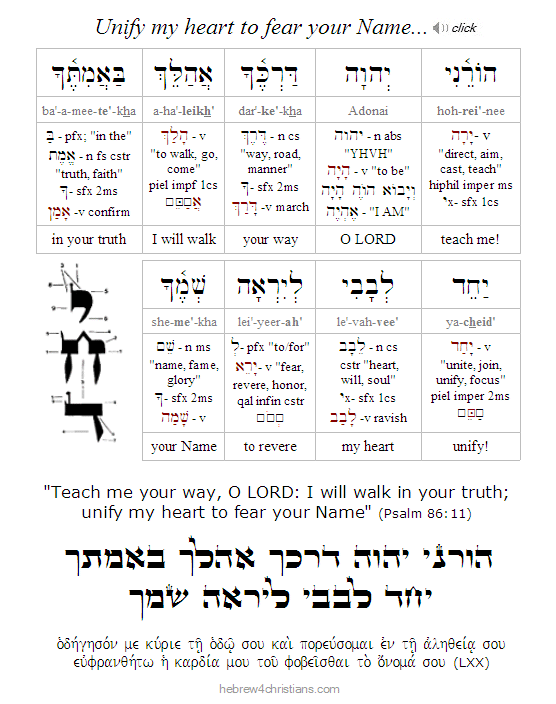
Note: The "desert experience" reveals what is hidden in our hearts... The murmuring and rebellion of the Israelites in the desert is our own, and our challenge is to find healing from our fears. Anger, doubt, boredom, cravings, and outright rebellion are symptoms of a deeper problem, and to change we must first confess our inner poverty, neediness, and emptiness (James 5:16). When we stop making excuses we can learn to trust in God's provision for our lives; we will taste of the heavenly manna and be satisfied; we will be delivered from our fears by be filled with God's love. The impulses that sought to lead us away from God will no longer be able to pretend to be the truth, since God's peace and love will direct the heart.
Finding Right Desire...
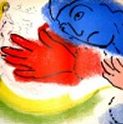
06.21.19 (Sivan 18, 5779) Our Torah portion this week (i.e., Beha'alotekha) recounts the rebellion of the people just after they left Mount Sinai for the Promised Land (Num. 11:1). Instead of joyfully anticipating their promised inheritance, however, the people grew dissatisfied and bored with the prospect of the journey before them. The Sefat Emet noted that just after the people complained to the LORD, they had a "strong craving" (הִתְאַוּוּ תַּאֲוָה), which in Hebrew literally means they "craved a craving" (Num. 11:4). Moses could tolerate the people's desire for food and water, but when they began to actively cultivate their cravings, lusting after the imaginary "free fish" they enjoyed in Egypt (Num. 11:5), he began to realize that the problem was deeper, a matter of the heart... Moses understood that what the people really wanted was impossible, since it involved denying who they were as God's redeemed people. The issue was not about wanting "meat" to eat, after all, but rather hungering after the forbidden, desiring to desire, etc. Creating desires, fomenting a sense of deprivation, and choosing to see yourself as a victim, is a lethal sickness of spirit, a disease of the soul. It is a "burning" (i.e., Taberah: תַּבְעֵרָה) that destroys inner peace (Num. 11:3). May God help us understand and seek what truly matters; may he deliver us from self-destruction; and may he help us to be satisfied with the manna he provides. Amen.
Note: For more on this topic, see "Graves of Craving: Further thoughts on Beha'alotekha."
 |
Our First and Last Amen...
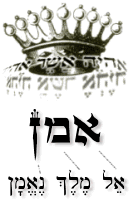
06.21.19 (Sivan 18, 5779) The first letter of the Hebrew alphabet, the letter Aleph (א), pictures the Word of God, the Holy Beginning. Aleph is "three-in-one," constructed from two Yods (representing "hands") joined by a diagonal Vav (representing a man). One Yod (י) reaches upward while the other reaches downward, and both extend from the "fallen" Vav (ו) that pictures a "wounded Man" or Mediator (1 Tim. 2:5). In the Hebrew numbering system, Yod = 10 and Vav = 6, so adding up the three parts of Aleph yields 26, the same value as the Name of the LORD, YHVH (יהוה). All of this linked together, friends. The very first letter of the alphabet, the "king of the letters," pictures the loving Word of God who mediates heaven and earth so that we can experience and know the meaning of God's redeeming love. Similarly, the first letter of the Bible is the Bet (בּ) in bereshit (בְּרֵאשִׁית), and the last is the Nun (ן) in amen (אָמֵן). Put together, we have ben (בֵּן), the Hebrew word for "son." Yeshua, God the Son, therefore is rightly called "the Amen, the faithful and true witness, the beginning of God's creation" (Rev. 3:14). He is the "radiance of the glory of God" (זוֹהַר כְּבוֹדוֹ), the "exact imprint of his nature," the One who upholds (φέρων) the universe by the very word of His power (Heb. 1:3).
 |
Note: The Jewish sages say that "amen" serves as an declaration of the Kingship of God (often said quietly before the reciting the Shema) that may be understood as an acronym for the phrase El Melekh Ne'eman (אֵל מֶלֶךְ נֶאֱמָן): "God (אֵל) is a faithful (נֶאֱמָן) king (מֶלֶךְ)." For all the promises of God find their "Yes" in the Messiah. That is why it is through him that we utter our Amen to God for his glory" (2 Cor. 1:20).
Suffering Hope...

06.20.19 (Sivan 17, 5779) If you receive no solace for your suffering; if you find no ready comfort despite repeated appeals to heaven; then you must surrender your heartache, your grief, and your troubles to God in complete trust of his overarching will: "My Father, if this cannot pass unless I drink it, your will be done" (Matt. 26:42). In this way you sanctify your suffering, trusting in God's care, even if you have been grieved by various trials (1 Pet. 1:6). Do not second-guess your trust; ask God for help and firmly believe that the One who knows the number of the hairs on your head also intimately knows this matter as well...
יְהוָה נָתַן וַיהוָה לָקָח
יְהִי שֵׁם יְהוָה מְברָך
Adonai · na·tan · vadonai · lah·kakh
ye·hee · shem · Adonai · me·vo·rakh
"The LORD gave, and the LORD has taken away;
blessed be the name of the LORD."
(Job 1:21)

Hebrew Study Card
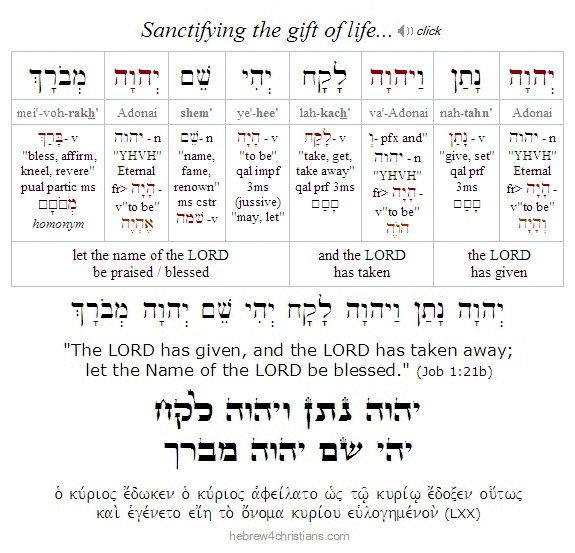
Job questioned the meaning of his life in light of his relentless suffering: "Cursed is the day that I was born... Why did I not die at birth, come out from the womb and expire? ... Why is light given to him who is in misery, and life to the bitter in soul?" (Job 3). Job's friends, so full of "piety" and religious wisdom, were quick to offer "God's answer" for his pain, though of course they did not really speak for God at all, but simply sought to protect themselves from facing their own fears... They needed an explanation to justify their own life, and therefore they sought to rationalize Job's torment. "God is perfect and never unjust," they insisted, and therefore Job's suffering was punitive, the result of his hidden sin, and ultimately intended to be corrective... Job rejected such religious platitudes and the notion of a "karma-based" theodicy, and instead directly appealed for heaven's vindication. Finally God allowed Job to voice his lament and to vent his pain and outrage, and only then - after Job had finished his case - was the revelation of God's mystery and love disclosed...
What Job didn't need were glib answers, cheap talk, shallow certainties, and sanctimonious cruelties... To be truly healed, Job needed to give voice to his pain, to struggle to receive God's care, and to rediscover the meaning and wonder of the Divine Presence despite his afflictions... Job needed someone safe to share his burden with, a friend who "sticks closer than a brother" (Prov. 18:24). Thank God for Yeshua, who feels the pain of our infirmities and intercedes for us with heaven's own sympathy (Heb. 4:15-16).
 |
Resisting the Darkness...

06.20.19 (Sivan 17, 5779) The Spirit states that in acharit ha'yamim (אַחֲרִית הַיָּמִים), the latter days, people will have "seared consciences," that is, a moral sense that is rendered unresponsive, numb, and unfeeling... People will be unable to discern the significance of moral and spiritual reality, thereby silencing any qualm of moral protest. We see this today in our scandal-saturated culture, as politicians brazenly lie with impunity and moral anarchy is openly celebrated. We must be careful not to heed the devil's logic of compromise, that "dialectic" that denies transcendental moral reality by pretending that truth can only be defined by the exigencies of the hour and its desire. "The world passes away and the lusts thereof..." (1 John 2:17). We must consciously remind ourselves that the LORD God of Israel does not endorse sin, regardless of any supposed political benefit given to the world at large, and that the end never justifies the means. God is not a pragmatist, and there are no "noble lies" for sake of the Kingdom of Heaven...
Martin Buber once said, "What is accomplished through lies can assume the mask of truth; what is accomplished through violence can go in the guise of justice, and for a while the hoax may be successful. But soon people realize that lies are lies at bottom, that violence is violence - and that both lies and violence will suffer the destiny history has in store for all that is false." As Yeshua himself said, "For this purpose I was born and for this purpose I have come into the world -- to bear witness to the truth. Everyone who is of the truth listens to my voice" (John 18:37). "Blessed are those who wash their robes, so that they may have the right to the Tree of Life and that they may enter the city by the gates. Outside are all those who love and practice the lie..." (Rev. 22:14-15).

Does the End Justify the Means?
In the realm of ethics, a basic problem with "means-to-end reasoning" is defining what is meant by "the good." It simply begs the question to say that what is "right" is that which brings about the desired outcome, since we must still explain why one outcome is more "desirable" than another. Political zealots have always defended their barbarity by claiming that it was for the sake of "a better world" or for a "greater good." Indeed the Antichrist will be a big believer that the "ends justify the means" as he employs global deception and global enslavement for the sake of his perverted vision of utopia.
The Scriptures reveal that we do not "discover" what is right by means of experience, but we bring to experience an intuitive sense of moral value and truth (Rom. 2:15). The Apostle Paul condemned the pragmatic thought, "let us do evil that good may come" (Rom. 3:8), which means he rejected the supposition that we can disregard the moral quality of our methods for the sake of a good end. Tragically people may think they are doing "many wonderful works" in God's name, and their goals may indeed be good, but the Lord will say to them, "Depart from me, you who practice lawlessness," because they are not doing according the will of the Father (Matt. 7:22-23). Even when the end is good, we must still walk out everything else God specified. We don't lie or sugarcoat the demands of the gospel, even if by employing such methods we were seemingly able to "convert" the entire world.
 |
Faith and Collision...

06.19.19 (Sivan 16, 5779) The theology of Messiah insists that truth matters, and that knowing the truth about God is absolutely essential for life itself. Nothing is more important; nothing is more vital. As Yeshua solemnly affirmed: "This is eternal life (חַיֵּי עוֹלָם), that they may know you, the only true God (אֶל־אֱמֶת), and Yeshua the Messiah (יֵשׁוּעַ הַמָּשִׁיחַ) whom you have sent (John 17:3). Note that the Hebrew word for knowledge is da'at (דַּעַת), a word that implies intimate cognitive differentiation and the apprehension of spiritual reality. Your life is a venture of faith, an irrepeatable, infinitely costly venture. Faith both affirms and negates at the same time. Like falling in love with someone, the cost of passionately believing that Yeshua (alone) is the "way and the truth and the life" comes at the expense of other faith possibilities -- and thereby incurs the risk of offense (Rom. 9:33, 1 Pet. 2:7-8; Gal. 5:11, Matt. 24:8-11; etc.). Does this make faith in Messiah intolerant then? Not at all... All faith expressions - including skepticism, universalism, or "politically correct" humanism - are exclusivistic commitments to whatever the believer embraces as his or her "ground of ultimate concern." Each person has their own "narrow gate" -- though this gate does not necessarily lead to life. Yeshua taught that the "narrow gateway of life" (שַּׁעַר אֶל־הַחַיִּים) is found only by the few (Matt. 7:13-14), and this doubtlessly was said to reprove the mob mentality that regards "tolerance" as the greatest of all virtues and fanaticism as the greatest of all evils. There is safety in numbers, the mob reasons, and the life of genuine conviction makes you an outcast of the group, since it exposes the "groupthink" and its inevitable moral evasions.... Public enemy number one is the person of real conviction. This was true in the days of the Hebrew prophets as it is today. "The voice crying in the wilderness" often cries alone.
Our faith says human beings are created b'tzelem Elohim - in the image of God. "In the beginning was the Logos" (John 1:1). Logic itself is "hard-wired" into us and any attempt to deny its validity presupposes its existence. Logic also presupposes any form of experience, since we cannot even identify something without its categories at work. Similarly, the sense of value is hard-wired into us. We cannot know anything without valuing (and willing) knowledge itself, and therefore our sense of value (and goodness) precedes all experience. So both empirical and moral truth is inescapable for self-conscious individuals. Now since faith is always faith in something, it is evident that it points to something "outside" of itself, namely, to reality. In matters of fact (rather than tautological statements such as a=a), the "belief that p" is an existential statement that "p exists." A particular belief can be mistaken, of course, but if it is a true belief then (by definition) it must proximally correspond to reality. In other words, our beliefs are confessions of faith concerning what is ultimately real.
Note: For more on this subject, see "Faith and Collision."
 |
The Armor of Light...
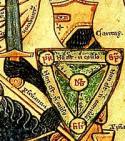
06.19.19 (Sivan 16, 5779) We are in the midst of a great spiritual war -- the war for the truth. This has been the battle from the beginning. The very first recorded words of Satan (הַנָּחָשׁ) questioned the veracity of God's love: "Did God really say...?" (Gen. 3:1), and the first word of deliverance was therefore rooted in affirming the faithfulness of God's promise (Gen. 3:15). In the end there will be found two types of people: those who love the truth and those who love the lie; these are children of light (בְּנֵי הָאוֹר) and children of darkness (בְּנֵי הַחשֶׁךְ), respectively. Followers of Yeshua the Messiah are told to "walk as children of light" / ὡς τέκνα φωτὸς περιπατεῖτε (Eph. 5:8). Children of light are called to be am kadosh - a holy people - separate from the evil engendered by the fallen world and its forces, just as the very first creative expression of God was the separation of light from darkness (Gen. 1:3-4). The children of light "hate evil and love the good," and conversely, the children of darkness "hate the good and love evil" (Psalm 34:21, Prov. 8:13, Amos 5:15, John 3:20-21). Yes, we hate sin, because sin separates people from healing; we hate sin but we love others. We are to walk in the peace and love of God; to do acts of justice and lovingkindness (Psalm 97:10). "No one can serve two masters, for either he will hate the one and love the other, or he will be devoted to the one and despise the other" (Luke 16:13).
In a sense, the history of humanity - especially as it has been expressed philosophically and politically through the centuries -- has been nothing less than the collusion to redefine reality as something that it isn't. "The kings of the earth station themselves, and the dignitaries (רוֹזְנִים) take counsel together against (lit. "over") the LORD and His Mashiach" (Psalm 2:1-3). Spiritual warfare is therefore the fight for sanity and truth in a world that prefers madness and self-deception...
Be vigilant! If the devil can't kill you, he will try to drive you insane... He will lie to you about who you really are... He he will harass you and vex your soul. He will whisper fearful things in your ear... He will make what is small seem big and what is big seem small. He will raise dark suspicion within your soul, causing you to walk in mistrust. He will remind you of your sins to make you feel ashamed and dirty. He will hiss that you are unlovable and unworthy. He will argue on behalf of your flesh that you deserve better than this... He will tempt you to seek relief in cisterns of emptiness and futility. Most of all, he will try to cast a spell to make you forget that you are truly a prince or princess of God Almighty... The devil seeks to drive you into the exile of loneliness and despair. Submit yourself to God and refuse to heed voices of fear or shame. Da lifnei mi attah omed: "Know before whom you stand!"
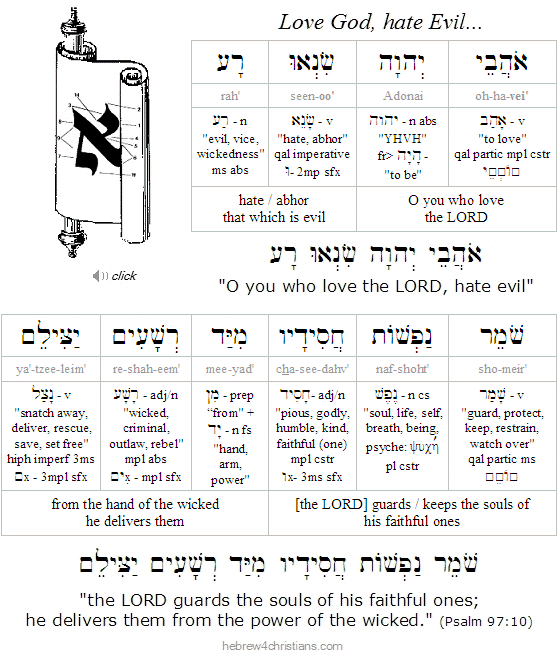 |
We have a moral duty, given by God Himself, to live according to spiritual reality. Confession means "saying the same thing" about ourselves that God says - and that means not only acknowledging our sins, but also affirming that we are loved by Him. Saying that God doesn't love you is a lie every bit as damning as denying His very existence. We gain access to the Divine Presence, we sojourn with him and "share his dwelling," as we live according to the truth: "O LORD, who shall sojourn in your tent? Who shall dwell on your holy hill? He who walks blamelessly and does what is right and speaks truth within his heart" (Psalm 15:1-2).
Faith in the Unseen Good...

[ The following is related to this week's Torah reading, parashat Beha'alotekha... ]
06.19.19 (Sivan 16, 5779) From our Torah portion this week (i.e., Beha'alotekha) we read: "At the command of the LORD they camped, and at the command of the LORD they set out" (Num. 9:23). This teaches us that God's Name is to be heeded every step of the way. Whenever we journey someplace, near or far, we say, "be'ezrat Hashem ('with God's help') I am going to this place, and I will stay for so long, im yirtzeh Hashem ('if it pleases God')." As James the Righteous reminds us, "You do not know what tomorrow will bring. For what is your life? You are a mist that appears for a little time and then vanishes (James 4:14-15). "Man is like a breath; his days are like a passing shadow" (Psalm 144:4). We share exile with the LORD in this age, as strangers and sojourners with Him; indeed, our lives are hidden with Him, waiting to be revealed (Col. 3:1-4). "The present form (τὸ σχῆμα) of this world is passing away" (1 Cor. 7:31), and the heart of faith looks for a city whose designer and builder is God Himself (Heb. 11:10). "So we do not lose heart... For the things that are seen are turning to dust, but the things that are unseen endure forever" (2 Cor. 4:16-18).
בְּכָל־דְּרָכֶיךָ דָעֵהוּ
וְהוּא יְיַשֵּׁר ארְחתֶיךָ
be·khol - de·rah·khey·kha · dah·ei·hoo
ve·hoo · ye·ya·sheir · or·kho·tey·kha

"In all your ways know Him,
and he will direct your paths."
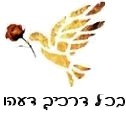
"Know God in all your ways," that is, in all that you put your hand to do respect God and ask for divine guidance (1 Cor. 10:31). As King David stated, "I have set the Lord always before me, because He is at my right hand, I shall not be moved" (Psalm 16:8). "Do do be wise in your own eyes, fear the LORD and turn away from evil" (Prov. 3:7).
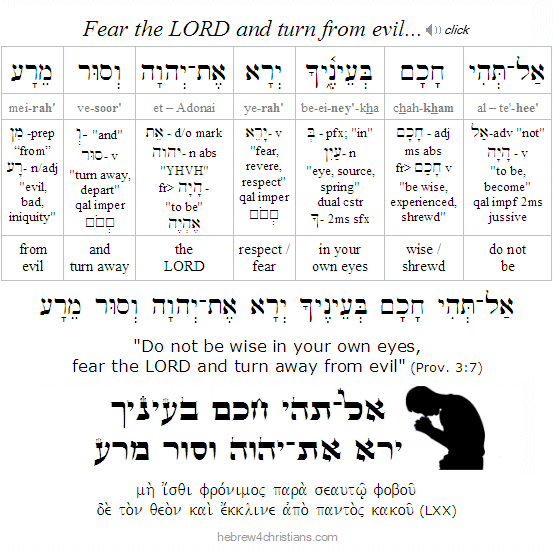 |
"Let your tongue acquire the habit of saying, 'I do not know,' so that you are not led to lie" (Berachot 4a). We have to learn that we don't always know the answer, and that often enough we don't even know the meaning of the question being asked... This is a matter of honesty. Accepting our limitations enables us to humbly ask God for help as we walk by faith. "The Spirit helps us in our weaknesses. For we do not know (οὐκ οἴδαμεν) what to pray for as we ought, but the Spirit intercedes for us with groanings too deep for words" (Rom. 8:26). We groan in hope... It is a blessedness to be free from the need to be seen, to be approved by others, to feel like we always have to be "right," to manage appearances, and so on. God opposes the proud, but his Spirit (רוּחַ) rests upon the lowly, the humble of heart. Therefore humility (i.e., anavah: עֲנָוָה) is considered one of the greatest of middot ha-lev (heart qualities). As it is written, the high and lifted up One dwells with the broken and lowly of spirit, to revive the spirit of the lowly and to revive the heart of the crushed (Isa. 57:15).
 |
Shelter of Light...
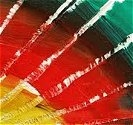
06.18.19 (Sivan 15, 5779) The sages say, "in the world to come (הַעוֹלָם הַבָּא), God will bring the sun out of its sheath to burn the wicked; they will be judged by it, but the righteous will be healed by it' (Shemot Rabbah). Yeshua is compared to the "Sun" because as the Sun is the central luminous body of our world, so Yeshua is called the "Light of Life" (אוֹר הַחַיִּים). Yeshua is melech ha-kavod (מֶלֶךְ הַכָּבוֹד), "the King of Glory" -- and no one can stand before the blinding power of His countenance (Psalm 27:4; Rev. 1:8-19). His is the "Fountain of Light" for all of creation, the Source and End of all life: "For by Him all things were created, in heaven and on earth, visible and invisible, whether thrones or dominions or rulers or authorities -- all things were created through Him and for Him. And he is before all things, and in him all things hold together... that in everything He might be preeminent" (Col. 1:16-18). Yeshua will come "with healing in his wings" -- that is, in healing radiance, with rays and beams, which metaphorically describe His influence over the hearts of men... Note that the word for "wings" used in this passage (i.e., kanaf: כָּנָף) pictures the image of a heavenly tallit (טַלִּית), or the heavenly firmament (רָקִיעַ) of the LORD's sheltering Presence.
Amen, there is a future time of healing and deliverance coming to us, though we must abide in the shadow of its substance for a bit longer: "For behold, the Day is coming (הַיּוֹם בָּא), burning like an oven, when all the arrogant and all evildoers will be stubble. The Day that is coming shall set them ablaze, says the LORD of hosts, so that it will leave them neither root nor branch. But for you who fear my Name, the Sun of Righteousness (שֶׁמֶשׁ צְדָקָה) shall rise with healing in its wings. You shall go out skipping like calves released from the stall. And you shall tread down the wicked, for they will be ashes under the soles of your feet, on the day when I act, says the LORD of hosts" (Mal. 4:1-3).
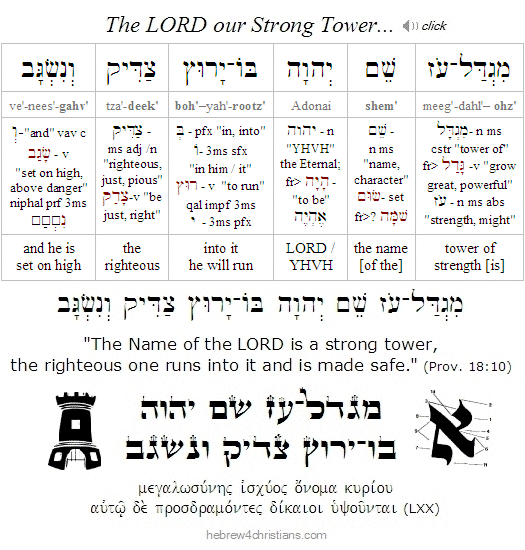 |
 |
Numbering our Days...
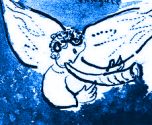
06.18.19 (Sivan 15, 5779) Perhaps the most common stratagem of the devil is to cheat us from the truth about reality, enticing us to believe lies based on fallacious assumptions (Isa. 5:20; 30:10). Therefore many people live as if God doesn't exist and that death does not occur. Instead of soberly acknowledging that their days are numbered in this world, they deny the reality of death, living as if the present moment will last forever, steadfastly ignoring any idea of judgment to come. Yeshua warned us, however, that "nothing is hidden except to be made manifest; nor is anything secret except to come to light" (Mark 4:22). We should tremble before such words. Each of us will give account for what we have done with the time given us (Heb. 9:27; 2 Cor. 5:10; Matt. 12:36). Moses therefore prayed to God: "teach us to number our days," that is, help us understand how to make our days count for eternity, to have a "weight of glory" (βάρος δόξης) that will shine in the world to come...
"As for man, his days are as grass. . . the wind passes over him and he is gone" (Psalm 103:15-16). Life goes by so quickly, and we never know when our personal "Rosh Hashanah" will come. "No one knows the day or hour..." That's why it is so vital to be healed and to turn to God while there is still time. So turn to him today and bacharta ba'chayim (בָּחַרְתָּ בַּחַיִּים) - "choose life!" "For this commandment (of turning to God) is not hidden from you, and it is not far away. It is not in heaven... nor across the sea.... Rather, the matter is very near you - in your mouth and your heart" (Deut. 30:11-14; Rom. 10:8-13).
לִמְנוֹת יָמֵינוּ כֵּן הוֹדַע
וְנָבִא לְבַב חָכְמָה
leem·noht · yah·mei·noo · ken · hoh·da
ve·nah·vee · le·vav · chohkh·mah

"Teach us to number our days aright
that we may attain a heart of wisdom."
(Psalm 90:12)

Download Study Card
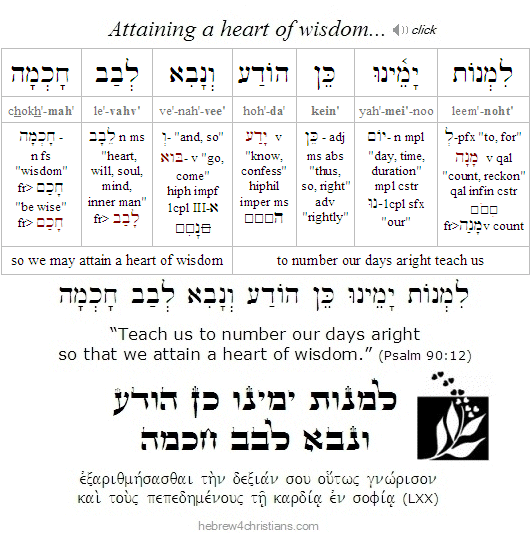
Despite the frailty and tenuous brevity of our days, may it please the LORD God to shine the power of His radiance upon us, and to establish our works for His praise. May He help us to "number our days" so that we may obtain levav chokhmah (לְבַב חָכְמָה) - a heart of wisdom to live according to His will (James 1:5). Above all else, may the "God of our Lord Yeshua the Messiah, the Father of Glory (אֲבִי הַכָּבוֹד), impart to you a spirit of wisdom and of revelation in the knowledge of Him (רוּחַ הַחָכְמָה וְהֶחָזוֹן לָדַעַת אתוֹ), having the "eyes of your hearts" (ὀφθαλμοὺς τῆς καρδίας) enlightened, that you may know what is the hope to which he has called you" (Eph. 1:17-18). May you be strong, resolute, and fully focused on our LORD, and may God make this real for us: Amen.
Signs of the Time...
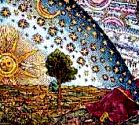
06.17.19 (Sivan 14, 5779) Despite the evident and manifold increase in the various prophetic "signs" that herald the return of Messiah, many people today seem apathetic and functionally agnostic regarding the imminence of the "End of Days..." Ironically, this indifference itself indicates the nearness of the hour, since Yeshua noted that just before the time of his return many would fall away because of a chosen ignorance of the truth and pervasive numbness of heart (Matt. 24:12). Therefore he rhetorically asked his followers, "When the Son of Man comes, will he find faith on earth?" (Luke 18:8). We are repeatedly urged to watch, to be vigilant, and to be ready: "Therefore you also must be ready, for the Son of Man is coming at an hour you do not expect" (Matt. 24:44).
יָקוּם אֱלהִים יָפוּצוּ אוֹיְבָיו
וְיָנוּסוּ מְשַׂנְאָיו מִפָּנָיו
yah·koom · E·lo·heem · yah·foo·tzoo · oh·ye·vahv
ve·yah·noo·soo · me·san·ahv · mee·pah·nahv

"God shall arise and scatter his enemies;
those who hate him flee from his presence."
(Psalm 68:1)

Hebrew Study Card
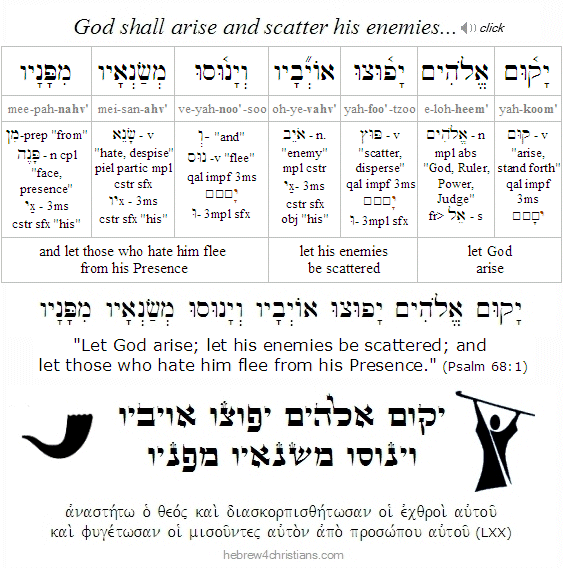
Light of the Shamash...

06.17.19 (Sivan 14, 5779) Our Torah portion this week (i.e., Beha'alotekha) begins with the LORD instructing Aaron to kindle the seven lamps of the menorah (מְנוֹרָה) so that the light from each would be "turned" toward its central shaft (Exod. 25:37; Num. 8:4). The entire menorah was formed mik'shah (מִקְשָׁה), that is, beaten from a single piece of pure gold (זָהָב טָהוֹר), and its base, shaft, branches, cups, fruits, and flowers were all "one" with its substance (Exod. 25:31). The central shaft upheld the light of the Shamash (servant or helper lamp) which also served as the trunk for the other branches. The radiance of the menorah symbolized the Divine light (shamash can also be read shemesh, "sun"), which is the radiance of Yeshua, the Tree of Light and the great Servant of the LORD (John 8:12; 1 John 1:5; Prov. 3:18). Yeshua is the light that gives light to every person created in the image of God (John 1:9). Our spiritual life stems from our connection with Him, since he provides us with support, sustenance, and illumination from the oil of the Holy Spirit (John 15:1-5).
Yeshua is the Light of the LORD (אוֹר יי). As it is written, "God is our light and our yeshuah (יְהוָה אוֹרִי וְיִשְׁעִי) our salvation" (Psalm 27:1; 1 John 1:5). He alone is the Light of the world (אוֹר הָעוֹלָם), the Shamash (שַׁמָּשׁ) who descends to ignite the "light of life" (אוֹר הַחַיִּים) within all who will believe. Our Savior is the Radiance (זוֹהַר) of the glory of God (Heb. 1:3), the Fire of God's holy countenance. The one who has the Son has life, but the one who refuses this life is spiritually dead. May we all walk in the Light of His countenance; "O house of Jacob, come, let us walk in the light of the LORD" (Isa. 2:5).
בֵּית יַעֲקב לְכוּ וְנֵלְכָה בְּאוֹר יְהוָה
beIt · Ya·a·kohv · le·khoo · ve·neil·khah · be·ohr · Adonai

"O house of Jacob, come, let us walk
in the light of the LORD"
(Isa. 2:5)

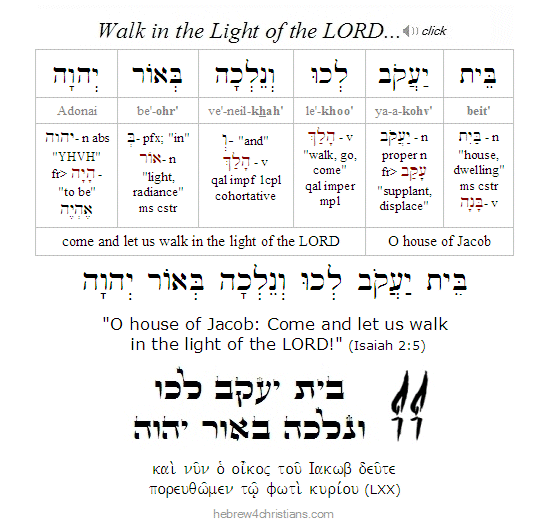
Note: For more on this topic, see "The Menorah and the Tree of Life."
The Divine Light...
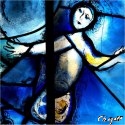
[ The following is related to this week's Torah reading, parashat Beha'alotekha... ]
06.17.19 (Sivan 14, 5779) "If I say, surely darkness covers me ... the night shines as the day; nothing hides from your radiance" (Psalm 139:11-12). We have to trust that God is in our darkness, in the silence, in the unknown... You come out of the shadows when you admit that you act just like other people, that you are human, in need of reconciliation yourself... Above all you need God. You need help. You need a miracle to help you to truly love. You may find excuses for many things, but you cannot escape the "wretched man that I am" reality that is grounded in your fears. God sees in the darkness and is present there, too. When you feel alone, like an unbridgeable gulf lay between you and all that is good; when you feel like you want to scream but are afraid that even then no one would hear, may the LORD shine His light upon you... Amen, may His light shine upon you.
גַּם־חשֶׁךְ לא־יַחְשִׁיךְ מִמֶּךָ
וְלַיְלָה כַּיּוֹם יָאִיר
כַּחֲשֵׁיכָה כָּאוֹרָה
gam · cho·shekh · lo · yach·shikh · mi·me·ka
ve·lai·lah · ka·yom · ya·ir
ka·cha·she·khah · ka·o·rah

"The darkness is not made dark to you;
but the night shines as the day:
as the darkness so is the light...
(Psalm 139:11)

"For it is you who light my lamp; the LORD my God outshines my darkness" (Psalm 18:28). There is "depression," and there is the dark night of the soul, and these are different matters, though they may overlap... "Hope deferred makes the heart sick." The dark night of the soul is an experience of trusting God in the darkness yet has a spiritual direction and end. We walk through this darkness with God and learn from him even there..
כִּי־אַתָּה תָּאִיר נֵרִי
יְהוָה אֱלהַי יַגִּיהַּ חָשְׁכִּי
kee · at·tah · ta·eer · nei·ree
Adonai · E·loh·hai · ya·gee·ah · khosh·kee

"For it is you who light my lamp;
the LORD my God will outshine my darkness."
(Psalm 18:28)

Hebrew Study Card
Parashat Beha'alotekha - בהעלתך
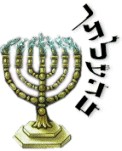
[ The Torah reading for this coming Shabbat is parashat Beha'alotekha... ]
06.16.19 (Sivan 13, 5779) Shavuah Tov, chaverim. Our Torah portion this week (i.e., Beha'alotekha) begins with God giving instructions about how Aaron was to service the lamps of the Menorah within the Holy Place of the Tabernacle (Num. 8:1-4). Each day Aaron was to clean each of the seven lamps and to refill them with the very purest olive oil. The wicks were then to be bent so that the six outer lamps shined toward the seventh (and central) shaft. The lamps were to be lit daily, "from evening until morning," in a specific sequence - starting from the central lamp (the shamash) and then moving right to left (Exod. 27:21). According to the Talmud (Shabbat 22b), while all the lamps received the same amount of olive oil, the central lamp miraculously never ran out of oil, even though it was kindled first in the sequence. This miracle is also reported to have occurred during the Temple period, though it abruptly ended about 40 years before the destruction of the Second Temple (c. 30 AD), after the death of Yeshua the Messiah, the true Servant and Branch of the LORD. As it is attested in the Talmud: "Our Rabbis taught: During the last forty years before the destruction of the Temple the lot ['For the Lord'] did not come up in the right hand; nor did the crimson-colored strap become white; nor did the centermost light shine" (Yoma 39a).
Our portion then describes how the Levites were to be set apart for service at the Mishkan or "Tabernacle" (Num. 8:5-12). In a ritual ceremony that signified a sort of "rebirth," the Levites were first sprinkled with mei hachatat (מֵי חַטָּאת), literally, "the waters of sin" (Num. 8:7), that is, holy water mixed with the ashes of the red heifer that was used to purify from contamination with death (Num. 19:13). Next they shaved off all their hair and were completely immersed in a mikveh (i.e., a bath containing flowing or "living" water). Notice that the steps of being sprinkled with purifying water, shaving off of all the hair, and being completely immersed in a mikveh were similar to the ritual for the cleansing of the metzora, or "leper" (Lev. 14:2-32). Rashi notes that each member of the community was then required to place their hands on the Levites' heads, just as the hands were placed on the head of a sacrificial animal as it was slaughtered before the altar (Num. 8:10; Lev. 1:4, 3:2). The "waving" of the Levites by the High Priest likewise simulated the ritual of "tenufah" (תְּנוּפָה), that is, the waving of the guilt sacrifice (asham) offered by the leper after his cleansing (Lev. 14:12). Finally, the Levites themselves laid their hands on the sin and whole burnt offerings for atonement before the LORD (Num. 8:12).
Note: There will be no "Shavuah Tov" audio broadcast for this week because of some health-related issues. Thank you for your understanding.
Bearers of His Peace...
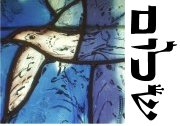
[ The following is related to this week's Torah reading, parashat Naso ("lift up!")... ]
06.14.19 (Sivan 11, 5779) Our Torah reading for this week records the ancient priestly blessing, the great expression of hope and grace that transforms us into "name bearers" of God. The blessing of the LORD guards us from illusion, directing our hearts to focus on what matters most. God's radiance changes us, revealing the miracle of grace. As God "lifts up his face," he discloses his Presence within all things, and imparts to us his healing peace. God's Name is "put upon" us so that we become vessels that carry redemptive love and healing to the world. We are endowed with divine energy to be made fruitful; we are empowered to serve God in the truth. The consciousness of our blessedness touches every moment, and we begin to see all of life as sanctified, sacred, full of wonder and meaning.
יְבָרֶכְךָ יְהוָה וְיִשְׁמְרֶךָ
יָאֵר יְהוָה פָּנָיו אֵלֶיךָ וִיחֻנֶּךָּ
יִשָּׂא יְהוָה פָּנָיו אֵלֶיךָ וְיָשֵׂם לְךָ שָׁלוֹם
ye·va·re'·khe·kha' · Adonai · ve·yeesh'·me·re'·kha
ya·eir · Adonai · pa·nav · e·ley'·kha · vee·khoon·ne'·kah
yees·sa · Adonai · ph·nav · e·ley'·kha · ve·ya·seim · le·kha · sha·lom

"May the LORD bless you and keep you;
May the LORD shine his face upon you and be gracious to you;
May the LORD lift up his face upon you and give you his peace."
(Num. 6:24-26)

Download Hebrew Study Card
Note that each of the three blessings that make up the "three-in-one" blessing of the priests (i.e., birkat kohanim) begins with the Hebrew letter Yod (י), suggesting the threefold hand of YHVH (יהוה) that touches you: the Father blesses you (יְבָרֶכְךָ); the Word of God shines upon you (יָאֵר), and the Spirit of God lifts you up and carries you in the way of life (יִשָּׂא). The threefold blessing is One, of course, just as Adonai echad: יְהוָה אֶחָד, the LORD is One (Deut. 6:4), and the essence of the blessing is to partake of healing and wholeness as expressed in the Hebrew word shalom (שָׁלוֹם). Amen. Without oseh shalom, without peace made within our hearts, any other blessings are only apparent and without substance...
Hebrew Lesson:
Numbers 6:24-26 Hebrew reading (click):
Shabbat Shalom and may God's Name rest upon you, friend... Amen.
Seeking God's Presence...

06.14.19 (Sivan 11, 5779) "Seek the LORD and his strength; seek His presence at all times" (Psalm 105:4). "Seek... seek." Two different words are used to express the idea of "seeking" the LORD in this verse. The first word is darash (דָּרַשׁ), which means to inquire or search carefully for something, and the second is bakash (בָּקַשׁ), which means to request something desired. Both kinds are seeking are needed, and in this order. First we need to know the LORD and the power of His might, and then we need to petition Him daily for help in our lives.
We must "carefully seek" God because His presence is often hidden from us. "I will hide my face... because you have turned..." (Deut. 31:17-18). Put another way, the "hiding of God's face" comes from our own hiding from God. Our sins separate us from God and cause His face to be hidden from us (Isa. 59:2). It is never God who turns away from us, but we who turn away from Him...God created man for loving fellowship, but man broke fellowship with God and turned away. Man's sin led to self-imposed exile and death. When God asked Adam, "Where are you?" he was asking him to "come out of hiding" to confess the truth about his condition (Gen. 3:9). Sin leads to the shame of alienation and ultimately to death.
But God never turned away from His love for man, not even after man had chosen to turn away from Him. God pursued man, even to the point of dying in his place as a sinner (Rom. 5:8). Yes, "God so loved the world" that He paid the price for man's sin and thereby delivered us from our exile. Just as both hands were placed on the head of an sacrificial animal to symbolize the "life for life" identification and exchange of the sinner with the sacrifice, so our sinful identity is exchanged for the righteousness of Messiah sacrificed on our behalf.... By faith we "lean our hands" upon the head of Yeshua, accepting that He is our sacrificial substitute before the Father. We "lean into Him," meaning we trust in the merit of His sacrifice and abandon our sins with Him... At the Cross God turns to us so that we can turn back to Him. It is the place where God cries out, "Here I am, Here I am" (Isa. 65:1).
"Seek ... seek." We seek God because He first sought us. This is always the right order. We "seek the LORD and His strength," which is another way of saying that "salvation is from the LORD" (Psalm 3:8). We do not seek God in the power of our own strength, but by trusting in the power of His might. "Not by works of righteousness," but by the heart's cry and trust... And we "seek His presence" at all times, always. Fellowship with God comes when we abide in a trusting relationship with Him. The Hebrew word "tamid" (תָּמִיד) recalls the perpetual sacrifice of the lamb made on our behalf. Because of Yeshua's constant intercession, we can boldly draw near to the Throne of Grace to receive help in time of need (Heb. 4:16; 7:25).
דִּרְשׁוּ יְהוָה וְעֻזּוֹ
בַּקְּשׁוּ פָנָיו תָּמִיד
deer·shoo · Adonai · ve·ooz·zoh
ba·ke·shoo · fah·nahv · tah·meed

"Seek the LORD and his strength;
seek his presence at all times."
(Psalm 105:4)

Hebrew Study Card
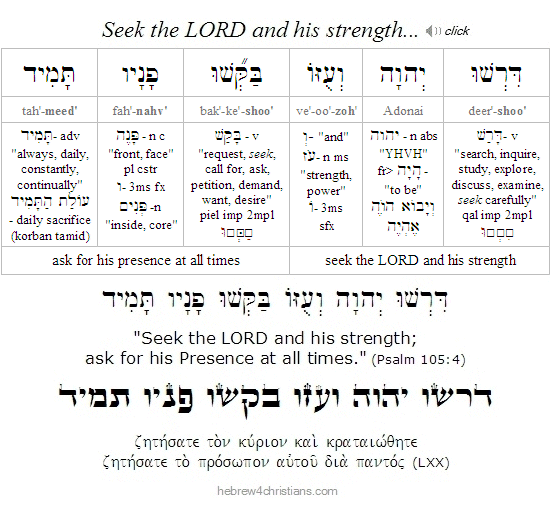 |
"It is not the path which is the difficulty; rather, it is the difficulty which is the path." The ancient Greek version of the Torah (i.e., the Septuagint) translates this verse, "Seek the LORD and be strengthed; seek His face through everything (διὰ παντός)." The LORD God gives us "inner strength" (i.e., ἐγκράτεια, from εν-, "in" + κράτος, "strength" or "power") when we yield to "the power of His might" (ἐν τῷ κράτει τῆς ἰσχύος αὐτοῦ) (Gal. 5:22-23; Eph. 6:10). Therefore we must remember God's power and glory, for "He is the LORD our God (הוּא יְהוָה אֱלהֵינוּ); His judgments are in all the earth" (Psalm 105:7).
Over and over the Scriptures command us to seek God's presence. "Seek the LORD while he may be found; call upon him while he is near" (Isa. 55:6); "Seek the LORD and live" (Amos 5:6); "You will seek me and find me, when you search for me with all your heart" (Jer. 29:13). "Seek first the kingdom of God and his righteousness" (Matt. 6:33). We are commanded to seek God because God wants to be sought; likewise, God seeks us because we desperately need His love... It is a "reciprocal seeking," a holy reconciliation, that the Spirit bears within us. As we draw near to God, He will draw near to us (James 4:8).
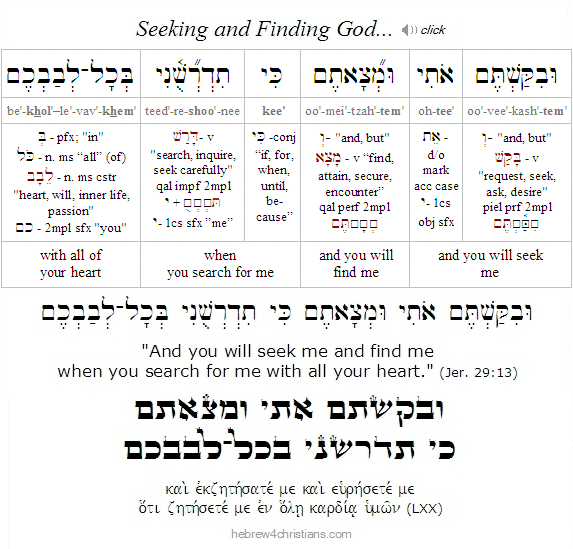 |
Personal note: I need your prayers, friends. I am having all sorts of technical problems with the main computer I use to develop this website, including the computer shutting off entirely, blowing a fuse in the house, and all my work for the day is lost (the computer's power supply might be going bad). This has happened repeatedly and it takes me quite awhile to restore the site and recreate the work. Thank you, friends, for your prayers for H4C.
The True Prophet like Moses...

[ The following is related to this week's Torah reading, parashat Naso ("lift up!")... ]
06.14.19 (Sivan 11, 5779) "The LORD your God will raise up for you a prophet like me from among you, from your brothers -- it is to him you shall listen" (Deut. 18:15). So who was this "prophet like Moses"? Islam claims it was Muhammad, though that is certainly false, since the true prophet to come would be a Jew who would be from the people Israel, not from another nation, and particularly not from the descendants of Ishmael. So what characteristics were to mark this extraordinary Jewish prophet to come? To answer that question intelligently, we must first consider the life of Moses so that we might detect the foreshadowing of the one who would be "like" him, that is, a prophet who would serve as an analog to his mission and life. Consider, then that after being chosen by God to deliver Israel from bondage during the time of the Exodus, Moses became 1) the mediator (priest) of the covenant between God and the Jewish people, 2) the legislator the various commandments of the Torah, and 3) the prophet who received the vision of the Mishkan (the Altar), the future exile, and the ultimate destiny and glory of Zion. Moses was extraordinary because as the mediator of Israel, he instituted various sacrificial rites before the laws of sacrifice were enacted. For example, he instituted the Passover sacrifice in Egypt (Exod. 12:1-11), and when the people later reached Mount Sinai, he offered blood sacrifices to ratify the terms of the covenant (Exod. 24:8). As the great legislator of Israel, Moses declared the terms of the covenant, serving as its voice of authority. And finally, Moses ascended the mountain and received the prophetic vision of the Mishkan (Tabernacle) before the priesthood had been instituted in Israel (Exod. 25:8-9). And even after the laws of the priests were proclaimed and the Mishkan was set up, Moses went before the very Holy of Holies to hear the Voice of the LORD, even though technically speaking this was forbidden, since he was not a kohen (i.e., descendant of Aaron). Indeed our Torah portion this week (i.e., parashat Naso) concludes, "And when Moses went into the tent of meeting to speak with the LORD, he heard the Voice speaking to him from above the mercy seat (i.e., kapporet: כַּפּרֶת) that was on the Ark of the Testimony, from between the two cherubim; and it spoke to him" (Num. 7:89).
"A prophet like unto me..." (Deut. 18:15). I mention all this because some people stumble over the fact that Yeshua, who was from the tribe of Judah, served as Israel's High Priest of the New Covenant. Of course this issue is addressed in the Book of Hebrews, where the role of the Malki-Tzedek priesthood is ascribed to King Yeshua (Heb. 5:6-11; 7:1-19), but it is important to realize that Moses himself foresaw the coming of the Messiah as Israel's great prophet, priest and King (Deut. 18:15-19; John 5:36). Indeed, just as Moses himself was "outside" the law by serving as Israel's priest but nevertheless was commissioned by God Himself, so also with Yeshua, who instituted the sacrifice of His blood as the Lamb of God and who went directly before God's Throne to intercede on our behalf.
For more on this subject, see "Moses' Prophecy of the Messiah."
 |
God's Persevering Love...

06.13.19 (Sivan 10, 5779) We are given many precious promises in Scripture, such as the promise that God will help us persevere unto the end (Rom. 8:28-39). As it is also written: "The LORD will protect you from all evil: he will watch over your life" (Psalm 121:7). Note that the Hebrew root for the verb "protect" in this verse is shamar (שָׁמַר), which first appears in the Bible in Gen. 2:15 where Adam was instructed to tend and "guard" the garden. It is also used in Gen. 17:9 where God instructed Abraham to "keep" His covenant. In fact, shamar is used over 400 times in the Tanakh, and the basic idea of the root is to "exercise great care over," to "watch over," to "guard," to "take heed," and to "restrain" or "tend" (as a flock). The Hebrew word for "evil" in this passage is ra' (רַע), a general term that may denote physical harm or personal distress, but more often refers to the immoral or unethical actions performed by others...
In Psalm 121, the LORD who is oseh shamayim va'aretz (עשֵׂה שָׁמַיִם וָאָרֶץ) - the Maker of heaven and earth - is the very One who will preserve (shamar) the soul (nefesh) of the one who looks to Him for help (v.2). He will guard (shamar) that soul and will not slumber (v3); he will watch over (shamar) Israel and will not sleep (v.4); He is that soul's keeper (shamar) (v.5) and will both preserve (shamar) that one from evil and guard (shamar) its life from evil (v.7); the LORD God of Israel will guard (shamar) that one's coming and going forever (v.8).
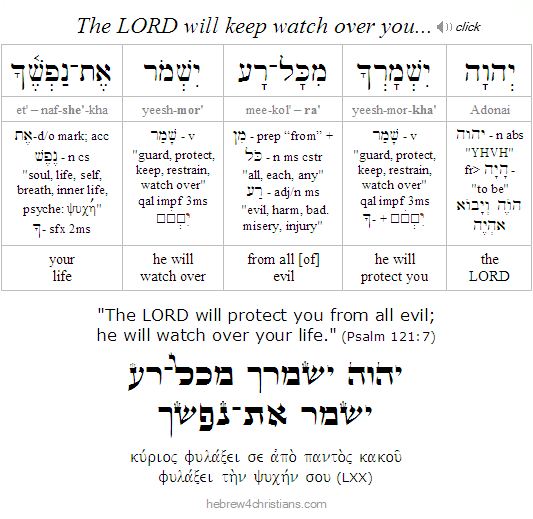 |
"The LORD will keep your going out and your coming in from this time forth and forevermore" (Psalm 121:8). In response to God's careful protection of our lives, we are instructed to likewise guard our hearts and keep them engaged with the LORD: "Above all else guard (shamar) your heart, for from it flow the springs of life" (Prov. 4:23).
Shade on your right hand...

06.13.19 (Sivan 10, 5779) When we forget that God is in complete control of all things, we tend to grow anxious... Feeling worried comes from focusing on ourselves, a perspective that can make us feel alone, forgotten, and even victimized in this world. Worry moves us to defend ourselves, to seek refuge in our own devices, and to forfeit the will of God according to the dictates of lesser fears... The sages say it is not permitted to worry: "To worry is a sin; only one sort of worry is permissible; to worry because one worries." We should worry that we worry because this indicates our hardness of heart and our unbelief! God's name YHVH (יהוה) means "Presence," "Breath," "Life," and "Love." So why be anxious for "tomorrow"? As we live today, we really only have this moment, but this moment is entirely sufficient when we walk in the light of God and seek to know him in all our ways. Amen, so we are admonished: "Let the peace of God rule in you" (Col. 3:15).
Where it says, "The LORD is your protector; the LORD is your shade at your right hand" (Psalm 121:5), note that God's Presence is likened to the shadow (צֵל) cast by someone who walks closely beside you, holding your hand (Psalm 23:4). Your "right hand" (יְמִינֶךָ) refers to your decision to "see the unseen" by performing acts of righteousness in this world: the blessing of God is then cast upon all you do (Deut. 2:7; Psalm 1:3). Neither does God "slumber or sleep," for the LORD your Guardian (יְהוָה שׁמְרֶךָ) is fully awake, full of life, insuperable power, and divine action! Our help comes from the LORD, "oseh shamayim va'aretz" (עשֵׂה שָׁמַיִם וָאָרֶץ) - the Maker of heaven and earth.
יהוה שׁמרך
יהוה צלך על־יד ימינך
Adonai · shohm·re'·kha
Adonai · tzee·le·kha · al-yahd · ye·mee·ne'·kha

"The LORD is your Protector;
the LORD is your shade on your right hand."
(Psalm 121:5)

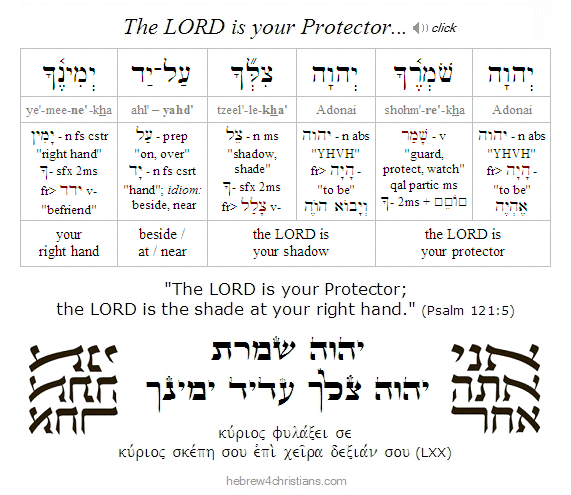
Where it is written in the Book of Genesis, "Let us make man in our image and likeness (בְּצַלְמֵנוּ כִּדְמוּתֵנוּ), we note that the word "image" (i.e., tzelem: צֶלֶם) comes from the word tzel (צֵל), meaning "shadow," thus suggesting that man was originally created to cleave to God as closely as a shadow follows its Substance. And just as a shadow resembles its originating substance, so man was to resemble the reality of the Divine Presence in this world. The New Testament reveals that essential purpose of the redeemed life is to become conformed (σύμμορφος) to the image and likeness of Yeshua (Rom. 8:29, 1 Pet. 2:21). "Just as we have borne the image of the man of dust, we shall also bear the image of the man of heaven" (1 Cor. 15:49). The work of the Spirit is "Messiah in you - the hope of glory" (Col. 1:27). The question therefore isn't, "do you accept Yeshua as your Savior" as much as it is, "Does Yeshua live inside your heart?"
Offering Breath Prayers...

06.13.19 (Sivan 10, 5779) In times of severe testing people often do not need further teaching, but rather "endurance," or what the New Testament calls hupomone (ὑπομονή), a word that means "remaining [μένω] under [ὑπο]" the Divine Presence while being tested. Suffering people do not need moral platitudes from others, but only the will to believe, the resolution to stay constant, and to ability breathe out simple prayers for help to the LORD: "God have mercy..." "Help me, O God..." "I need Thee, O Lord..." When we receive grace to faithfully suffer, we hear the Spirit whispering back to us: "Be not afraid..." "Live in me..." "Walk in the light..." "I am with you always..." "You are loved..."
רְפָאֵנִי יְהוָה וְאֵרָפֵא
הוֹשִׁיעֵנִי וְאִוָּשֵׁעָה כִּי תְהִלָּתִי אָתָּה
re·fah·ei·nee · Adonai · ve·ei·rah·fei
ho·shee·ei·nee · ve·ee·va·shei·ah · kee · te·hee·lah·tee · ah·tah

"Heal me, O LORD, and I shall be healed;
save me, and I shall be saved, for you are my praise."
(Jer. 17:14)
Download Study Card

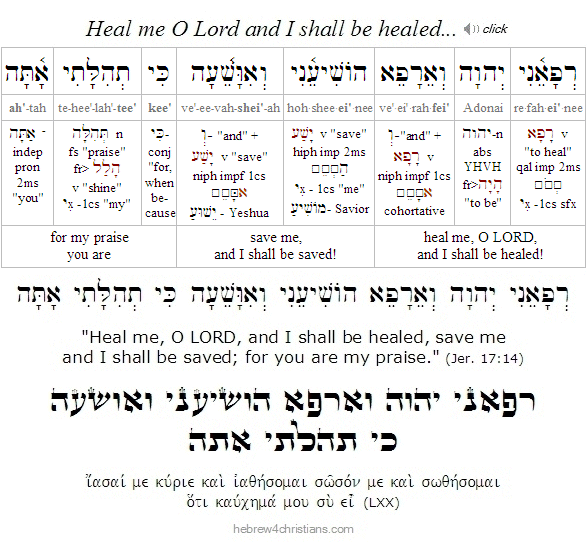
Secret Place of the Most High...
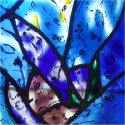
06.12.19 (Sivan 9, 5779) One of the great Hebrew names of God is El Elyon (אֵל עֶלְיוֹן), often translated as "God Most High." The name first appears in the Torah regarding the mysterious figure of Malki-Tzedek (מַלְכִּי־צֶדֶק), the timeless king and priest of Zion who served "bread and wine" to our father Abraham – alluding to the sacraments later used to commemorate our redemption (Gen. 14:18). As the timeless king and priest of God, Malki-Tzedek is a "theophany," or a revelation of the LORD our God Yeshua before He emptied Himself and made his descent to this world (Phil. 2:7; Heb. 7:3). Yeshua is our great King of Kings and High Priest of the New Covenant, a better covenant that restores the kingship and priesthood back to God Himself (Heb. 7:12).
Now the Hebrew term "Elyon" itself (עֶלְיוֹן) comes from a root word (עָלָה) that means "to ascend" or "to lift up." For instance, an "olah offering" (עלָה) is a whole burnt offering that ascends upward to heaven, and "aliyah" (עֲלִיָּה) means "going up" to the land of Israel. The word "Elyon," then, expresses the truth that the LORD is the Resurrected One who overcame all the powers of hell and utterly vanquished death's power. In other words, Elyon is a name for the LORD our God Yeshua.
ישֵׁב בְּסֵתֶר עֶלְיוֹן
בְּצֵל שַׁדַּי יִתְלוֹנָן
yoh·sheiv · be·sei·ter · Elyon
be·tzeil · Shad·dai · yeet·loh·nahn

"He who dwells in the secret place of the Most High
will abide in the shadow of the Almighty."
(Psalm 91:1)

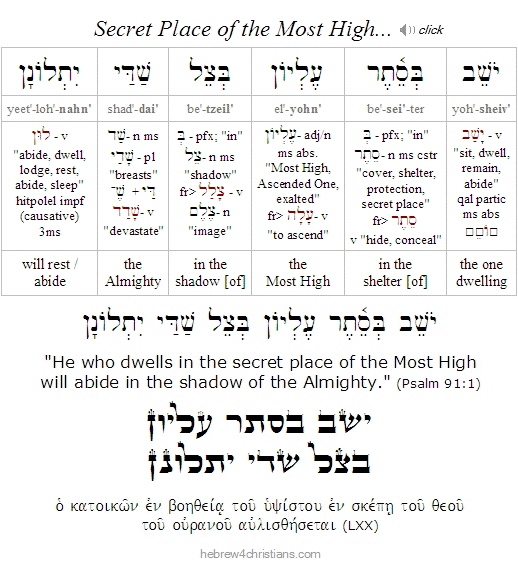
The sages say that Moses wrote Psalm 91 as he dwelt in the secret place (סֵתֶר) of the Most High God, in the "midst of the dark cloud" (Exod. 24:18), a place of sacred and holy concealment. The thick clouds are a "hiding place" for him (Job 22:14). Notice that the one who "abides" in the secret of the Most High dwells in an ascended place of rest – being lifted up above the surrounding madness of this fallen world of flux and shadows. The Hebrew word means to lodge or to "sleep" (לִין), connecting it metaphorically with death and resurrection. By dwelling in the death and resurrection of Yeshua, God will shield you with His Presence and make evil powerless before you.
אמַר לַיהוָה מַחְסִי וּמְצוּדָתִי
אֱלהַי אֶבְטַח־בּוֹ
oh·mar · Ladonai · mach·see · oo·me·tzoo·dah·tee
E·loh·hai · ev·takh-boh

"I will say to the LORD, [who is] my refuge and my fortress,
'[you are] my God, in whom I trust.'"
(Psalm 91:2)

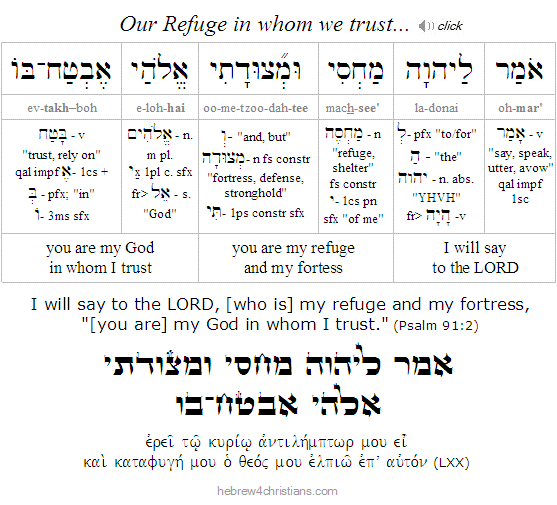 |
Since God hides Himself in this world (Isa. 45:15), we must humbly seek His face to enter into the place of His holy concealment in all things. God is Elyon – High above - but He dwells "with the lowly and the broken of heart" (Isa. 57:15). Therefore the LORD our God is called Shaddai (שַׁדַּי) – our Sustainer, Provider, Refuge, and Home. Just as we can be surrounded by the "shadow of death" (tzal mavet), so we can be surrounded by the "shadow of Shaddai" (tzal Shaddai). Like a powerful eagle brooding over her chicks, so Shaddai covers you with wings of protection (Psalm 91:4).
When you "abide" in the secret of Elyon - the Ascended One - you are concealed by the dark clouds of His Glory, and the Presence of Shaddai overshadows you... The LORD will save you from the ensnaring trap and from the devastating pestilence (Psalm 91:3). By abiding in the truth that God's Presence pervades all things at all times - you become a "stranger" (גֵּר) with the LORD in this world, a "sojourner" (תּוֹשָׁב) who awaits the recompense of the wicked and the healing of the world at the end of the age. "You will tread on the lion and the adder; the young lion and the serpent you will trample underfoot" (Psalm 91:13).
For more on this wonderful topic see: "Secret of the Most High."
 |
The Faith of Ruth...
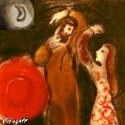
06.12.19 (Sivan 9, 5779) During the holiday season of Shavuot (i.e., "Weeks," or "Pentecost") it is customary to revisit the courage of Ruth the Moabitess, who by faith became one of the matriarchs of Israel. Like Ruth, we have to "go to the threshing floor" as a forbidden outsider to lay claim to the redeeming love of God. We have to courageously answer the question, "Who are you?" by expressing our need for redemption and our faith in the compassion of God... "I am your servant, spread your garment over me, for you are my redeemer" (Ruth 3:9). We have to push past the enmity required by the Torah with its commandments and ordinances to receive our healing - and to find our place within the family of God. When we do, we will hear the words of the Spirit saying: "Great is your faith! Be it done for you as you desire" (Matt. 15:28).
וַיּאמֶר מִי־אָתּ
וַתּאמֶר אָנכִי רוּת אֲמָתֶךָ
וּפָרַשְׂתָּ כְנָפֶךָ עַל־אֲמָתְךָ
כִּי גאֵל אָתָּה
vai·yoh·mer · mee · aht?
va·toh·mer · ah·noh·khee · Root · a·mah·te·kha
oo·fah·ra·stah · khe·nah·fe·kha · al · a·mah·te·kha
kee · go·eil · ah·tah

"He said, "Who are you?"
And she answered, "I am Ruth, your servant.
Spread your garment over your servant,
for you are a redeeming kinsman."
(Ruth 3:9)
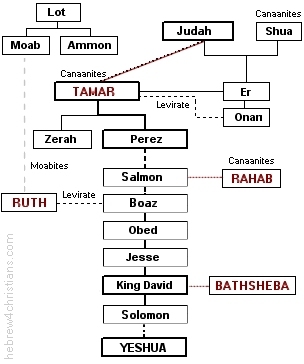
Note that in the verse above, the word kanafayim (כנפיים), sometimes translated as "wings," can refer to a garment (used as a blanket), but metaphorically it can refer to a wedding canopy – a chuppah – symbolizing the covering and protection of covenantal love... Ruth asked Boaz to take her under his protection, to love her, to marry her.
The story of Ruth reveals that God has a great compassion for the outsider, for the lost, and for those who are without inheritance in this world. Just as we are commanded va'ahavta le'reakha kamokha (וְאָהַבְתָּ לְרֵעֲךָ כָּמוֹךָ), to love our neighbor as ourselves (Lev. 19:18), so we are commanded ve'ahavta lo kamokha (וְאָהַבְתָּ לוֹ כָּמוֹךָ), to love the stranger as ourselves (Lev. 19:34), and that means opening our hearts toward others to make them feel welcome in our presence. May the LORD our God help each of us to extend love, compassion, and acceptance to everyone we encounter today.
Note: For more on this topic, see "The Chesed of Ruth."
 |
Spiritual Transformation...

06.11.19 (Sivan 8, 5779) Our moral and spiritual convictions are compromised whenever we passively accept or tolerate the thought patterns and values of a culture that denies the truth of spiritual reality. The "brainwashing" process is often subliminal as we read or listen to the rumors and "news" crafted by mass media, because we rarely stop to challenge the godless and profane assumptions and fallacious implications being passed off as "truth." The same thing can happen when we partake of the world's entertainment and attend to its fads, fashions, and idolatry. We must be careful to challenge and resist the world's spurious values and to renounce its godless perspectives lest we lose ourselves and forfeit our minds and affections to utter vanity (2 Cor. 10:5). The danger of "losing ourselves" by surrendering our thinking to a group may also be found in various religious communities, where peer pressure to exhibit a particular set of "virtues" is required in order to feel a sense of belonging (e.g., manner of dress, favorite doctrinal biases, preferred rituals of "worship," etc.). We must be vigilant not to engage in hypocrisy to gain the group's approval, thereby defiling our conscience... The risk of being dishonest for the sake of pleasing others can even affect our most intimate relationships. As the Kotzker Rebbe once said, "If I am I because I am I, and you are you because you are you, then I am I and you are you; but if I am I because you are you and you are you because I am I, then I am not I and you are not you." To escape such entanglement, we must find courage to embrace our existential aloneness and to find our value in God's love and blessing. Only after we are grounded in our identity as a child of God will we be free from the need to be approved by others (Gal. 1:10).
"The further a society drifts from truth, the more it will hate those who speak it." - George Orwell
Our faith sets up a conflict with any interpretation of reality that excludes, suppresses, denies, or minimizes the Divine Presence, and constitutes a heavenward cry for the place where we truly belong.... If you feel crazy in an insane situation, then you are really quite sane... The world will feel oppressive and strange once you have been awakened from its madness and refuse to be moved by the delusions of the crowd... Life in olam hazeh (this world) is a place of passing that leads to the world to come. Our faith affirms that underlying the surface appearance of life is a deeper reality that is ultimately real and abiding. It "sees what is invisible" (2 Cor. 4:18) and understands (i.e., accepts) that the "present form of this world is passing away" (1 Cor. 7:31).
The Breath of Life....

06.11.19 (Sivan 8, 5779) Torah without Spirit is like a body without soul... As I've mentioned elsewhere on this site, the Name YHVH (יְהוָה) is connected with life-giving Spirit. Before man first came alive, the LORD breathed into him nishmat chayim (נִשְׁמַת חַיִּים), the "breath of life" (see Gen. 2:7; Job 12:10). Later, Moses called the LORD Elohei ha-ruchot lekhol basar (אֱלהֵי הָרוּחת לְכָל־בָּשָׂר), which can be translated "the God of the breath of all flesh" (Num. 16:22). Indeed, the name YHVH is unutterable apart from breath, from ruach (רוּח), since each letter represents a vowel or breathing sound. Yeshua breathes out to his followers and says, "Receive the Holy Spirit" (John 20:22). It is the breath of God that breathes into us to make us truly alive. When we open our hearts to receive the life-giving Spirit, we find comfort and help. God's spirit breathes out prayers within us (Rom. 8:26), reveals the truth about Yeshua (John 15:26), transforms our inner character (Gal. 5:22-23), imparts spiritual gifts (1 Cor. 12), and gives us the life from heaven (John 3:8). Bo ru'ach Yeshua (בּא רוּח ישׁוּע), "Come, spirit of Yeshua!"
Personal Note: Shalom dear friends. We have been enduing a lot of testing lately, and we deeply appreciate your prayers for this ministry to continue. Thank you so much. - John
 |
A Blessed Desperation...
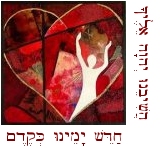
06.11.19 (Sivan 8, 5779) "And he opened his mouth and taught them, saying... 'Blessed are those who hunger and thirst for righteousness, for they shall be filled'" (Matt. 5:6). Many people hunger for spiritual experiences, for material "blessings," or for signs of the miraculous, while others seek knowledge and wisdom, but it is the righteousness of God that alone truly satisfies the heart (Matt. 6:33). This righteousness is not achieved by means of performing religious rituals or by doing good deeds, but instead "comes to life" within the heart by trusting in Yeshua, the righteousness of God (צִדְקַת אֱלהִים). He is the vine and we are branches, and as we draw life from him, his life flows within us to bear deeds of righteousness to the praise and glory of God (John 15:1-5; 1 John 3:7). But note that while we can't attain righteousness by means of virtuous deeds, the cost for attaining such is confession of the truth of our condition: brokenness and mourning of heart (Matt. 5:3-4). Those who profoundly hunger for deliverance from their moral bankruptcy and grieving of heart will be satisfied, but only those who do so. God will indeed wipe away our tears, but the tears must be shed...
The Torah of Yeshua is heeded by the "impoverished of spirit" who know they must "find God or die." It is first a word spoken to the shattered of heart and crushed of spirit. Those who empty themselves before God will find their own desire fulfilled, for God will satisfy them with inner peace and joy. This is the righteousness of God that is known by yielding to His love secured in Messiah. The "fruit of the Spirit" is then expressed in the heart through acts of gratitude and mercy, that is, "faith working through love" (Gal. 5:6). Teshuvah is always a response to God's compassion, as it says, "we love him because he first loved us" (1 John 4:19). Paradoxically, we never find ultimate satisfaction in finite things, but only by seeking the Eternal One, and by means of seeking the infinite we find the delight to seek further still: "Come further up, come further in!" It is great blessedness to be desperate for God, to long for him more and more; to keep asking, seeking, knocking (Matt. 7:7). When we seek first the kingdom of God and his righteousness as our supreme need, God will satisfy us by drawing us into an ever-deepening desire for him.
כִּי־הִשְׂבִּיעַ נֶפֶשׁ שׁקֵקָה
וְנֶפֶשׁ רְעֵבָה מִלֵּא־טוֹב
kee · hees·bee'·a · ne'·fesh · shoh·kei·kah
ve·ne'·fesh · re·ei·vah · mee·lei · tov

"For he satisfies the thirsting soul,
and the hungry soul he fills with good things."
(Psalm 107:9)

The LORD alone can satisfy the eternal yearning of our spiritual nature. As Augustine said, "You have made us for yourself, O Lord, and our hearts are restless until they rest in you."
"Blessed are those who hunger and thirst for righteousness, for they shall be filled" (Matt. 5:6). This beatitude again follows logically from the previous ones; it is a statement to which all the others lead. It is the logical conclusion to which they come, and it is something for which we should all be profoundly thankful and grateful to God. I do not know of a better test that anyone can apply to himself or herself in this whole matter of the Christian profession than a verse like this. If this verse is to you one of the most blessed statements of the whole of Scripture, you can be quite certain you are a Christian. If it is not, then you had better examine the foundations again." - D. Martin Lloyd Jones: Studies in the Sermon on the Mount
This great blessedness is found only by those who seek God be'khol levavkha, with all their heart, as it is written: "Seek me and live" (Amos 5:4). But we must be vigilant, since a common tactic of the enemy of our souls is to induce us to forget our desperate need, seducing us to think we have already "arrived" or that we "know" all the answers. This is a grave danger. Those who regard themselves as rightly related to God are often deluded regarding their spiritual status (Luke 18:9-14; Rev. 3:15-20). The seeking heart is humble and knows that it has not yet attained to righteousness (Phil. 3:12-14).
The fruit of the Spirit (פרי הרוח)

[ The following is related to the holiday of Shavuot and the advent of the Spirit... ]
06.10.19 (Sivan 7, 5779) "If there is no seed, there is no fruit;" and the type of seed always determines the type of fruit (1 Pet. 1:23; 1 John 3:9). We can sow to the flesh – and reap corruption - or we can sow to the Spirit - and reap life everlasting (Gal. 6:7-8). The formation of "Messiah-like character" is the result of discipline (παιδεία), a word that means to instruct or rear a child (παιδεύω) and is therefore connected with discipleship and education. Indeed, the Hebrew word for "discipline" is musar (מוּסָר), a term that refers to moral instruction and guidance, whereas the word for "education" is chinukh (חִנּוּךְ), a term that shares the same root as the word "dedication" (i.e., chanukah: חֲנֻכָּה). Unlike the Greek view that regards education as a pragmatic process of improving one's personal power or happiness, the Hebrew idea implies dedication/direction to God and His concrete purposes on the earth. Disciples of Yeshua are therefore called talmidim (תַּלְמִידִים), a word that comes from lamad (לָמַד) meaning "to learn" (the Hebrew word for teacher is melamad (מְלַמֵּד), a word that shares the same root). There can be no discipline apart from education..
The "heart of Scripture" is revealed the Book of Psalms, and the Psalms begin with the declaration that the one who delights in God's Torah (תּוֹרָה) and meditates upon it "day and night" will be blessed with a genuinely fruitful life:
וְהָיָה כְּעֵץ שָׁתוּל עַל־פַּלְגֵי מָיִם
אֲשֶׁר פִּרְיוֹ יִתֵּן בְּעִתּוֹ
וְעָלֵהוּ לא־יִבּוֹל
וְכל אֲשֶׁר־יַעֲשֶׂה יַצְלִיחַ
ve·hah·yah · ke·eitz · shah·tool · al · pal·gei · ma·yeem
a·sher · pe·re·yoh · yeet·ten · be·ee·toh
ve·ah·lei·hoo · loh · yeeb·bohl
ve·khol · a·sher · ya·a·seh · yatz·lee·akh

"He is like a tree transplanted by streams of water
that yields its fruit in its season,
and its leaf does not wither.
In all that he does, he prospers."
(Psalm 1:3)

In the New Testament we read, "For the moment all discipline (παιδεία) does not seem full of joy but of sorrow, but afterwards it yields the peaceful fruit of righteousness to those who have been exercised by it" (Heb. 12:11). The Greek word used for "exercised" is gumnadzo (γυμνάζω), often used to refer to training for competitive gymnastic events. Despite the analogy of training or "exercising" the physical body to comply with the directives of the spirit, however, it is important to remember that the life of God is a miracle that comes from God's own source of Life. It is the fruit of the Spirit, after all, and not the result of human effort or moral reformation. See John 15:1-8. Our lives are sanctified in the manner in which they were initially justified: wholly by faith in the love and grace of God. Just as we are unable to "crucify ourselves," so we are unable to produce fruit for God in ourselves. As Yeshua said, "Without me you can do nothing..." We need God's heart to know God's heart.
The searching question that we need to ask ourselves is whether our lives indeed give evidence to the power and agency of the Holy Spirit. Strictly speaking, these nine virtues are qualities that only God Himself possesses, since He alone is perfectly loving, perfectly joyful, and so on. But since we are created betzelem Elohim (in the image of God) and were given the Holy Spirit to help us resemble our Teacher (Luke 6:40), spiritual fruit should be seen in our own lives (John 14:12; 15:1-8; 26-7). The outgrowth of such fruit is invariably a matter of faith - trusting that God will help us live our lives in truthful union with Him. If our lives are devoid of fruit, perhaps we are devoid of faith, and therefore the first step is to return to the LORD for healing and life...
 |
Parashat Naso - נשא
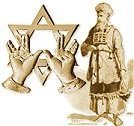
[ Today marks the Jubilee of the holiday of Shavuot, chaverim! Chag Shavuot Sameach! ]
06.10.19 (Sivan 7, 5779) Shavuah tov my dear friends... Our Torah portion for this coming week (i.e., parashat Naso, "lift up!") includes the cornerstone blessing that Aaron and his sons (i.e., the priests) were instructed to declare over the people of Israel: "The LORD bless you and keep you; the LORD shine his face upon you and be gracious to you; the LORD lift up his face upon you and give you his peace" (Num. 6:24-26). Notice that the Hebrew text of the blessing (see below) begins with three words, is comprised of three parts, invokes the divine Name three times, and is therefore appropriately called "the three-in-one blessing" (שלוש בברכה אחת). Notice also that the words are spoken in the grammatical singular rather than plural because they are meant to have personal application, not to be a general benediction over a crowd of people. The phrase, "the LORD lift up his face upon you..." (יִשָּׂא יְהוָה פָּנָיו אֵלֶיךָ) pictures the beaming face of a parent lifting up his beloved child in joy... The repetitive construction of God "lifting up His face" (יְהוָה פָּנָיו אֵלֶיך) indicates that he gazes upon you in love and blessing. Undoubtedly Yeshua recited this very blessing over his disciples when he ascended back to heaven, though He would have spoken it in the grammatical first person: "I bless you and keep you (אני אברך אותך ואשמור לך); I shine upon you and am full of grace toward you; I lift up my face toward you and givie you my shalom" (see Luke 24:50-51).
יְבָרֶכְךָ יְהוָה וְיִשְׁמְרֶךָ
יָאֵר יְהוָה פָּנָיו אֵלֶיךָ וִיחֻנֶּךָּ
יִשָּׂא יְהוָה פָּנָיו אֵלֶיךָ וְיָשֵׂם לְךָ שָׁלוֹם
ye·va·re'·khe·kha' · Adonai · ve·yeesh'·me·re'·kha
ya·eir · Adonai · pa·nav · ei·ley'·kha · vee·khoon·ne'·ka
yee·sa · Adonai · pa·nav · ei·ley'·kha · ve·ya·seim · le·kha · sha·lom

"The LORD bless you and keep you;
The LORD shine his face upon you and be gracious to you;
The LORD lift up his face upon you and give you his peace."
(Num. 6:24-26)
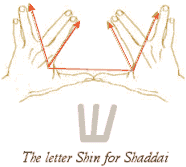
Download Hebrew Study Card
Note: The verbs in this blessing are all "jussive," usually expressing wish, desire, or command, though understood in context (i.e., as part of the blessing recited by the kohanim during ceremonial occasions), the verbs should be regarded as declarative or oracular. The idea of God "lifting up his face" is an idiomatic expression meaning that he gazes upon you in peace and blessing... To learn more about this blessing, click here.
The Tree of Life...
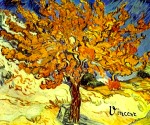
06.09.19 (Sivan 6, 5779) The Scriptures state twice: "Take root downward and bear fruit upward" (2 Kings 19:30; Isa. 37:31). As Yeshua said, "unless a grain of wheat falls to the ground and dies, it abides alone; but if it dies, it brings forth much fruit (John 12:24). We pray we might surrender ourselves to the Lord fully, being immersed in His passion, "bearing fruit in every good work (ἐν παντὶ ἔργῳ ἀγαθῷ καρποφοροῦντες) and growing in da'at HaShem (דַעַת אֱלהִים) - the knowledge of God" (Col. 1:10). The "fruit of the righteous is a Tree of Life" lit., etz chayim (עֵץ חַיִּים), literally, "the Tree of lives" (Prov. 11:30). It is the fruit of Yeshua, the Tzaddik of God, the Righteous One, who bears fruits of healing in the lives of those who turn to Him in trust...
The "Tree of Life" (i.e., etz ha'chayim: עֵץ הַחַיִּים) is mentioned ten times in Scripture, corresponding to the "ten words of God" (i.e., the Ten Commandments). In the Torah it first appears in the center of the paradise of Eden (Gen. 2:9; 3:22-4), but it is soon lost to humanity because of Adam's transgression. In the book of Revelation, it reappears in the center of the Paradise of God (Rev. 2:7, 22:2), resurrected on account of the faithful obedience of Yeshua as mankind's "last Adam" (1 Cor. 15:45). Those who have washed their robes by means of His righteousness are given access to this Tree in the heavenly Jerusalem (Rev. 22:14). The paradise lost by Adam has been regained by the greater ben-adam, the Son of Man, Yeshua the Messiah, the Savior of the children of men...
עֵץ־חַיִּים הִיא לַמַּחֲזִיקִים בָּהּ
וְתמְכֶיהָ מְאֻשָּׁר
eitz-khai·yeem · hee · la·ma·cha·zee·keem · bah
ve·toh·me·khey·ha · me·oo·shar

"A tree of life [is Torah] to those who lay hold of it,
and those who grasp it are blessed."
(Prov. 3:18)

Hebrew Study Card
The parable is told of a man who fell from a boat into the sea, and the captain of the vessel threw him a rope and shouted, "Take hold of this rope and do not let go lest you die!" (Bamidbar Rabba 17). The sages comment that like a drowning soul we must take hold of Torah and not let go, as it says, "A tree of life it is to those who lay hold of it, and those who grasp it are blessed" (Prov. 3:18). Therefore take lay of the wisdom of God while you can; doing so leads to blessing and life! Happy Shavuot, friends.
Note: Here are the ten times the "Tree of Life" appears in the Scriptures:
- Gen. 2:9; 3:22; 3:24
- Prov. 3:18; 11:30, 13:12, 15:4
- Rev. 2:7, 22:2, 22:14
Fruit of the Spirit...

[ The great holiday of Shavuot ("Pentecost") begins sundown, Saturday June 8th... ]
06.07.19 (Sivan 4, 5779) During Shavuot (i.e., "Pentecost") we celebrate the giving of the Holy Spirit who would write the Torah upon our hearts (Jer. 31:33; Heb. 10:16-17; Acts 1:4 2). Now regarding the middot ha-lev (qualities of heart) that are to mark the follower of Yeshua, the Apostle Paul wrote, "the fruit of the Spirit (פְּרִי הָרוּחַ) is love, joy, peace; long-suffering, generosity, acts of kindness; faithfulness, humility, and modesty – against such there is no Torah" (Gal. 5:22-23). Notice that while there is "one fruit" of the Spirit (i.e., "fruit" [καρπὸς] is singular), God produces a manifold yield, just as the Tree of Life (עֵץ הַחַיִּים) produces twelve different kinds of fruit, one for each month of the Jewish year (see Rev. 22:1-2).
Of course love (i.e., ahavah: אַהֲבָה) is the very "first fruit" of the Spirit, and rightly so, since "God is love" (1 John 4:8) and the mark of the follower of Yeshua is likewise be love (John 13:35). The Greek word Paul uses is agape (ἀγάπη), which is one of the most frequently occurring words in his vocabulary of the Christian life. After all, loving God is the primary obligation of life: "Hear, O Israel... love the LORD your God with all your being" (Deut. 6:4-6), and the apostle later states that the practice of love is the fulfillment of the Torah: "For the whole law is fulfilled in one word: "You shall love your neighbor as yourself" (Gal. 5:14). "Owe no one anything, except to love each other, for the one who loves another has fulfilled the law (Rom. 13:8). This is the "kingdom law" (νόμον βασιλικὸν) mentioned in James 2:8. Love is the Source from which all the other virtues flow and is their underlying reason: "I live by faith in God the Son, who loved me and gave Himself for me..." (Gal. 2:20).
"For God so loved the world that He gave..." (John 3:16). God's love is expressed in sacrificial giving, since He is the Source and reason for all that exists. "God, who needs nothing, loves into existence holy superfluous creatures in order that he may love and perfect them" (C.S. Lewis; the Four Loves). The best definition of love (ἀγάπη) is found in 1 Cor. 13, where it is described as longsuffering and kind, full of humility, generosity, forgiveness, and so on. Love always uses the "good eye" (עַיִן טוֹבָה) to resist thinking evil about about others (lit., "does not impute the bad" - οὐ λογίζεται τὸ κακόν, in 1 Cor. 13:5) and rejoices in the truth. Love bears all things, is full of trust and hope for the good... Such is the portrait of Messiah.
Though God's love is the font and source for all the other virtues of grace, it has a practical focus in this list, suggesting that love for God will be manifested as good will and good deeds shown to others (1 John 3:17). Though the love of God has been "poured out" (ἐκκέχυται) into the hearts of believers in Yeshua by the Spirit (Rom. 5:5), love is nevertheless a matter of the will, an act of duty and a divine obligation, rather than mere sentiment or matter of the affections, and therefore we are called to love our enemies in this age, that is, to indiscriminately practice acts of righteousness that will benefit them.
Note: For more on this topic see: "The Fruit of the Spirit: Further thoughts on Shavuot."
 |
 |
The Book of Ruth and Shavuot...
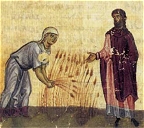
[ The great holiday of Shavuot ("Pentecost") begins sundown, Saturday June 8th... ]
06.07.19 (Sivan 4, 5779) During the time of Shavuot it is customary to read the Book of Ruth, which (מְגִלַּת רוּת) tells a marvelous story of redemptive love and devotion (i.e., chesed: חֶסֶד) dating back to the dark period of Jewish history known as the "time of the Judges" (c. 12th century BC). The story is traditionally read during Shavuot, both because the events recounted took place during the time of the spring harvest (linking it to the agricultural aspect of holiday), and Ruth herself is a picture of willing acceptance of a Jewish lifestyle (linking it to the religious aspect of the holiday). Just as Israel willingly accepted the Torah at Sinai without knowing its content (kol asher diber Adonai na'aseh v'nishmah), so Ruth gave up everything she knew to accept the Torah. Like the people of Israel, Ruth believed in order to understand, not the other way around...
While the narrative of the story is straightforward, to fully understand its spiritual implications we need to be familiar with several laws from the Torah, including the laws of redemption (Lev. 25:32-55), the laws of Shemittah and Jubilee years (Lev. 25:4, 10, 23), the laws of family inheritance (Num. 27:8-11), the laws of yibbum or "levirate marriage" (Deut. 25:5-10), and various farming laws regarding leaving food for the poor and the stranger (Lev. 19:9-10; 23:22; Deut. 24:19). In addition, we need to understand the laws of warfare for taking possession of the land, and God's repeatedly stated commandment that Israel must be holy and not assimilate with surrounding cultures (Exod. 34:12; Deut. 7:1-6; 14:2, etc.). This restriction applied not only to the seven Canaanite nations (Deut. 7:1; 20:17-18), but also to the descendants of Lot (i.e., Amnonites and the Moabites), since they showed enmity to Israel when they first came to the land (Deut. 23:4-6). Indirectly, then, the story of Ruth provides a strong message to Christians: to follow the story of redemption, you must understand the Torah and its commandments!
For more on this see topic see: "The Chesed of Ruth: Further thoughts on Shavuot."
 |
Beware False Prophets...

06.07.19 (Sivan 4, 5779) "Beware of false prophets," Yeshua warned, "who come to you in sheep's clothing (literally, "the skins of sheep," ἐν ἐνδύμασι προβάτων), but who inwardly are ravenous wolves. You will recognize them by their fruits" (Matt. 7:15; cp. 2 Pet. 2:1). However, because they come in disguise, pretending to be "children of light," we must be all the more vigilant. On the one hand, we must beware of those who "wrap themselves in a tallit" (legalists) and teach that we should come under the yoke of the law (Matt. 23:15), and on the other hand, we must beware those who deny or minimize words of the Torah, and who falsely claim that the way to heaven is "broad," and that we therefore have licence to walk after the desires of our own hearts (antinomianists). We must use discernment, chaverim. The LORD allows false teachers in our midst to test our hearts: "For there must be factions among you in order that those who are genuine among you may be recognized" (1 Cor. 11:19). Therefore we must "test the spirits" to see if they are "of God," that is, whether they focus on the righteousness of God given exclusively through Yeshua, the "narrow way that leads to life" - or whether they focus on something else. The Ruach HaKodesh always centers the heart on the glory of God revealed in Yeshua (John 16:14; 1 Cor. 2:2, etc.).
 |
Receiving Revelation...
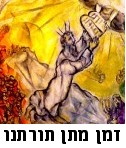
06.07.19 (Sivan 4, 5779) The sages have asked, "Why is Shavuot ("Pentecost") called 'zman mattan torateinu,' the time of the giving of our Torah, rather than 'zman kabbalat torateinu,' the time of the receiving of our Torah? The reason is that on that momentous day at Sinai, only the giving of the Torah occurred, whereas the receiving of the Torah must take place each and every day, as it says, "Trust in the LORD 'bekhol libbekha' (בְּכָל־לִבֶּךָ) - with all your heart; and know Him 'bekol derakhekha' (בְּכָל־דְּרָכֶיךָ), in all your ways" (Prov. 3:5-6). The giving of the Torah is described as a "loud and never-ending voice" (Deut. 5:22), though it is our constant responsibility to shema – to receive the invitation of God's heart.
"Trust in the LORD with all your heart... know Him in all your ways" (Prov. 3:5-6). The Hebrew word for trust is "bittachon" (בִּטָחוֹן), from a root word (בָּטָח) that means "to lean upon," to feel safe and secure.... Bittachon describes emotional acceptance of the goodness of the LORD. Some of the sages have said that while emunah (אֱמוּנָה), or "faith," represents a state of cognitive or intellectual understanding (בִּינָה) that God is involved in all the events of the universe, bittachon means emotionally trusting that the Lord is present in every situation for your good.... Rabbi Bechaya put the distinction this way: "Everyone with bittachon has emunah, but not everyone with emunah has bittachon." Bittachon is an intuitive awareness of the personal love of God for your life, coupled with complete trust that He deeply cares for you (Rom. 8:28). It is an expectation that the love of God is "I-AM-always-with-you," too.
"Know Him In all your ways," and that means whatever way you find yourself in, which of course includes the way of your struggles, your transgressions, and your heartaches, as well as the way of your deepest longing and hope...
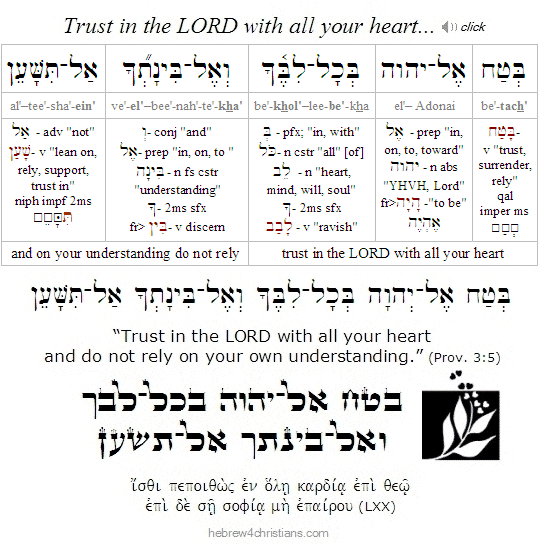 |
 |
Heart of Goodness...

[ The great holiday of Shavuot ("Pentecost") begins sundown, Saturday June 8th... ]
06.07.19 (Sivan 4, 5779) It is traditional to read the "Chapters of the Fathers" (i.e., Pirkei Avot: פרקי אבות, a section of the Mishnah/Talmud) during the countdown from Passover to Shavuot. In Pirkei Avot 2:10, the sages debated what was the most important attribute to become a suitable bearer of God's message on earth. One sage answered, having a good eye (ayin tovah); another said being a good neighbor, and another said being wise in one's deeds. Rabbi Elazar, however, said having a "good heart" (לֵב טוֹב) was most important, which was agreed to be the best answer. Having a good heart is the foundation for spiritual life, but it is truly impossible to have such a heart apart from the miracle of the Holy Spirit. Note that the gematria of a "good heart," or lev tov (לֵב טוֹב), is 49, the number of days between Passover and the giving of the Holy Spirit at Shavuot (i.e., Pentecost). May God pour out His Spirit upon us so that we have the heart of Yeshua within us!
 |
 |
Revelation and Study...
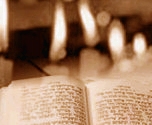
06.07.19 (Sivan 4, 5779) Some of the sages have made a connection between the Ten Days of Repentance (i.e., the time between Rosh Hashanah and Yom Kippur) and the giving of the Ten Commandments during Shavuot (i.e., "Pentecost"). Studying God's revelation is a prelude to re-experiencing the joy of His Presence, though this of course requires diligence and hard work. In order to understand what God requires of us, then, we must make an honest effort to study the truth of Torah and to practice it in our lives...
In Hebrew the word chinukh (חִנּוּךְ) means "education," a word that shares the same root as the word "chanukah" (חֲנֻכָּה, dedication). Unlike the ancient Greek view that pragmatically saw education as a humanistic means of escaping from "the cave of ignorance" to better one's personal power or happiness (Plato), the Jewish idea of education implies dedication to God and His concrete purposes on the earth. For example, the Rambam notes that the word chinukh is borrowed from the Torah's description of dedicating a tool for use with the Holy Altar, "habituating the tool for its work." In other words, godly education is a process of being made a "fit vessel" for the service of God in the world. All other ends of knowledge ultimately exist for this purpose, and rightly understood, education is a form of worship.
בְּאֵין חָזוֹן יִפָּרַע עָם
וְשׁמֵר תּוֹרָה אַשְׁרֵהוּ
be'ein · kha·zohn · yee·pah·ra' · ahm
ve·shoh·meir · toh·rah · ash·rei·hu

"Where there is no prophetic vision, the people cast off restraint,
but blessed is the one who keeps Torah" (Prov. 29:18).

Download Study Card
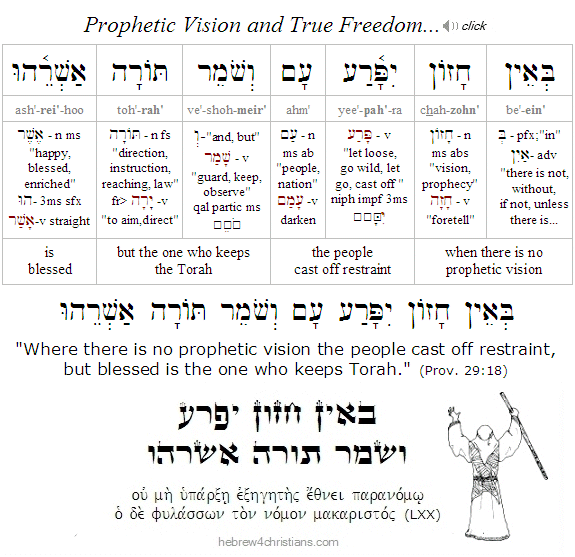
May God make Torah sweet on our tongues and to help us be "engrossed" in the words of the Scriptures. There is no real blessedness apart from the truth of the Holy One...
Be Filled with the Spirit...
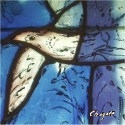
06.07.19 (Sivan 4, 5779) Our Heavenly Father sees in secret... "The deepest thing in our nature is this region of heart in which we dwell alone with our willingnesses and our unwillingnesses, our faiths and our fears" (William James). It is there, in the secret place of the heart, that the sound of the "knock" is either heard or disregarded (Rev 3:20). May the Lord give us the willingness to do His will and the courage to believe in His love. And may God deliver us from doubt and from every other fear. May we all be strong in faith, not staggering over the promises, but giving glory to God for the miracle of Yeshua our LORD. May we all be rooted and grounded in love so that we are empowered to apprehend the very "breadth and length and height and depth" of the love of God given to us in Messiah, so that we shall all be filled with all the fullness of God. Amen.
Whatever happened to sin?

06.06.19 (Sivan 3, 5779) In our nihilistic and postmodern age the word "sin" does not refer to selfish or malicious actions that violate the will of God, but has been redefined in psychological (or social) terms, usually as a form of "disorder" that imprisons people to self-defeating or "unhealthy" habits (caused by outside forces, such as economic status, racial status, or other "me-too" issues of the day). Humanistically speaking, "forgiveness of sin" means "adjusting the person" to be free from any anxiety of divine judgment, with the therapeutic goal of enabling the soul to pursue personal happiness (or retribution) without regard to the moral law of God... In the Scriptures, the most common Hebrew word for sin (i.e., chet: חֵטְא) is often translated as "missing the mark" (i.e., of the divine ideal) though that definition does not capture the intent of the person, that is, the decision (often subconsciously expressed) to aim at a mark contrary to what is good. Sinning, in other words, should not be regarded as passively "missing" the will of God, as if it were an "accident" of some sort, but rather as actively defying God's will by choosing a different goal altogether. In this sense sin may be understood as treason against truth, open rebellion against divine authority, the willful defiance of moral order, and the deification of the self as the object of ultimate concern... Sin is the expression of idolatry within the human heart.
Rightly understood, then, sin is not an occasional "misstep" of the will, but an eternal falling away from the Eternal -- an ontological break from Reality and Truth. We are not sinners because we sin, we sin because we are sinners, and that means that the problem of our inner rage, fear, and despair calls for deliverance – objective salvation and healing – from the root sickness of "spiritual death." The first condition for receiving deliverance, then, is rigorous honesty, especially with ourselves: "The purest of heart is precisely the one most willing to comprehend his own guilt most deeply. Without purity of heart, no one can see God, and without becoming a sinner, no human being can come to know God" (Kierkegaard). We must be careful here. This is not a matter of "morality" or "ethics" – that is, a failure to understand what is right, but instead constitutes an unwillingness to understand, a refusal to will the rightness of truth. That is why the original sin was rooted in an act of will, not in an act of knowing, since the essence of the temptation was expressed in the decision to define good and evil in merely human terms.
We can only find salvation through the consciousness of our own sin and need for deliverance, and any attempt to enter by another way is treason against the message of the cross of Messiah. This is the "terrible struggle" with the Eternal – with God and oneself – as we let go and die to the self-life; as we surrender and engage God's truth – which again is not found by mere intellectual assent, but by an act of will, by teshuvah, by faith, and by learning to find faith despite yourself along the way. The LORD "dwells" with one who is of a contrite and lowly spirit (Isa. 57:15), he "tabernacles" within the heart of the poor in spirit, with those who mourn over sin and who hunger and thirst for His righteousness...
 |
Connected to the Vine...

06.06.19 (Sivan 3, 5779) Yeshua taught us: "If anyone does not live in Me, he is cast off as a branch, and withers..." (John 15:6). We find life only as we remain connected to the Source and Conduit of life, who is the Messiah, the Savior and LORD. True life grows out a heart connection with Yeshua, and without that connection our lives become vain and yield no eternal significance (John 15:5). Be forewarned: it is the sacred truth of the Messiah that if you do not live in the Vine you will be suffer eternal loss, since life is found in no other Source (John 14:6; Luke 3:9). Be encouraged, however: The yoke of Messiah is easy, and His burden is light: we cannot create new life by our own best efforts nor effect regeneration by means of our own "good works" (John 1:3; Titus 3:5; 2 Tim. 1:9). No, the work of salvation is God's alone, and we partake of that work as we abandon our self-efforts and religious conceits (see Isa. 32:17). There remains, therefore, a Sabbath for the people of God, "for whoever has entered God's rest has also rested from his works as God did from his" (Heb. 4:9-10). This "deep Sabbath" of rest is a matter of trusting that the finished work of salvation has been provided on your behalf. Therefore relax, for the LORD always effects what is best for you, and not much is under your control anyway. The path of peace is to surrender to God's care for your life and let the evils and drama of this world flow past you. Look to heavenly reality and not to the shadows and deceits of this world (Col. 3:1-4). Live in Yeshua's Presence, drawing strength and vitality from your relationship with Him. The fruit of the Holy Spirit is produced as we yield ourselves to the love and presence of God.
The "Torah of the Vine" (תּוֹרַת הַּגֶּפֶּן) also teaches us that "every branch that bears fruit will be pruned so that it may bear more fruit" (John 15:2). Note first that it is the healthy branch that will be cut back - not the withered one that will be altogether removed – and this purging process may be painful at times. The heavenly Vinedresser's goal is for the fruitful branch to yield more fruit, to reveal more and more the connection to the Heart of the Vine, so that God is glorified (see John 15:8). The end here is the beatific vision: "Blessed are the pure in heart, for they shall see God" (Matt. 5:8). Note that the Greek word translated "pure" is katharos (καθαρός), sometimes used describe the cleansing of a wound (catharsis), or to describe the unalloyed quality of a substance revealed through refining fire. Sanctification involves "catharisis" of the ego – the exile of carnal desire, the mortification of our will, the release of truth in the inward parts. A faith that thinks God will make us immune to suffering, challenges, and tribulation is immature and imperfect. The goal of "purging" is fruitfulness and blessing, but the agency is not the will of man but the power of God. You are made "clean" through the word of God spoken within your own heart (John 15:3). Your sanctification, however, depends on your communion with God, staying connected to what is real, central, vital, the core truth of God's Presence and love, the ultimate Reality of Life itself.
"If anyone does not live in Me, he is cast off and and withers...." Yeshua here teaches that shared life is the goal of our relationship with him, but if that does not occur, destructive consequences follow. This has been called the "dark side" of God by some mystics, by which they mean that God will destroy everything in us that is not fit to exist and that does not yield true blessedness (Luke 3:9). Of course this "destruction" (or correction) is really a great blessing, since it purges us from worthlessness that brings pain, disease, and sorrow (this in distinction to the devil, who seeks to destroy what is healthy and good). The upshot here is that we must carefully attend to our inner life and our connection with God, understanding that to be the utmost good for our lives, seeking God's Presence in all our ways. Therefore we read, "Above all else guard your heart, for from it flow the springs (or contours) of life" (Prov. 4:23).
מִכָּל־מִשְׁמָר נְצר לִבֶּךָ
כִּי־מִמֶּנּוּ תּוֹצְאוֹת חַיִּים
mee·kohl · meesh·mar · ne·tzor · lee·be'·kha
kee · mee·me'·noo · to·tze·oht · chai·yeem

"Above all else guard your heart,
for from it flow the springs of life"- Prov. 4:23

Hebrew Study Card
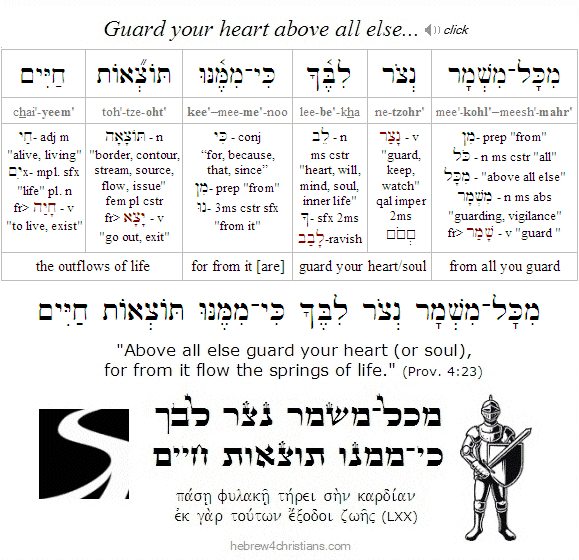
Consider your assumptions and the "default" ways you tend to think about things.... Since Yeshua is the Center, the Heart, and the Source of all beauty, meaning, love, grace, and life for you, test all other truth claims based on that relationship… The devil trafficks the lie and seeks to entice you to bite his hook. We overcome the power of the lie by means of truth, and the various affairs of this world – its drama, it's "news" and its rumors, its fads, trends, idols, and fashions, its unspoken assumptions that impugn the witness of Scripture – must be mediated by the word of Messiah within you. Take every thought captive to the truth of God; bring it before the bar of the Divine Presence and coerce it to bend the knee (2 Cor. 10:5). Friend, the stakes are high. People live their lives in unstable and pain-filled ways because they refuse to "come to themselves" and understand the Ground of existence, the Heart of God that overarches and sustains all things...
Accounted by God...

06.06.19 (Sivan 3, 5779) Our Torah reading for this week, parashat Bamidbar, is always read just before the holiday of Shavuot (i.e., Pentecost), which is the time we celebrate "mattan Torah" -- the giving of the Torah of the LORD (first at Mount Sinai, later at Mount Zion). Central to sefer Bamidbar, or the Book of Numbers, is the counting of the person, identifying his "place" within Israel (Num. 1:52), and therefore the sages link the idea of being counted by God with the giving of the revelation itself. In other words, as we come to know who we are as God's redeemed people, as we learn to reckon ourselves as his beloved, so we will receive Torah and be accounted among his people. Our heads will be "lifted up," and we will receive the first blessing of Torah, namely: אנכי יהוה אלהיך - "I AM the LORD your (singular) God" (Exod. 20:2).
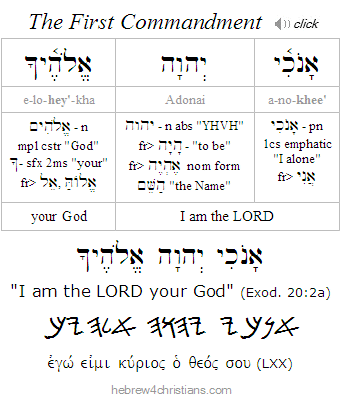 |
"The LORD spoke to Moses in the desert of Sinai... saying 'Lift up the head' (i.e., count) of the children of Israel (Num. 1:1-2). The Torah commentator Rashi insightfully noted that as we are counted, so we are lifted up and beheld by God. In other words your life matters to heaven, and you are counted worthy because of God's great redeeming love. The sages say that each of us is as a letter of Torah; each of us counts in God's book. Indeed our beloved Savior Yeshua said, "Even the hairs on your head are numbered" (Matt. 10:30).
May you lift up your head and be counted as one of God's own, friend....
Revelation of the Torah (התגלות התורה)
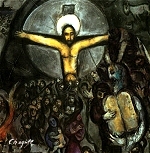
[ The following is related to the holiday of Shavuot which begins Sat., June 8th at sundown... ]
06.05.19 (Sivan 2, 5779) During the holiday of Shavuot ("Weeks," "Pentecost") we remember how the LORD graciously condescended to meet with the Jewish people at Sinai, and how all the people heard the Voice of God (קול האלוהים) speaking from the midst of the fire (Deut. 4:33). This awesome event foreshadowed the great advent of the King and Lawgiver Himself, when the Eternal Word (דבר יהוה) became flesh to dwell with us (Phil. 2:6-7; John 1:1,14), and it further foreshadowed the advent of the Spirit of Truth given to the disciples of Messiah (Acts 2:1-4). Any theology that regards God as entirely transcendent will have a problem with divine immanence, since the highness, holiness, and perfection of God will make him seem distant, outside of us, far away, and even unknown... Incarnational theology, on the other hand, manifests the nearness of God to disclose the divine empathy. Indeed, the LORD became Immanuel (עמנו אל), "one with us," to share our mortal condition, to know our pain, and to experience what it means to be wounded by sin, to be abandoned, alienated, forsaken. The "Eternal made flesh" bridges the gap between the realm of Ein Sof (אין סוף), the Infinitely transcendent One, and the finite world of people lost within their sinful frailty. Of course we believe Adonai Echad (יהוה אחד) - that the "LORD is One" - both in the sense of being exalted over all things but also in the sense of being compassionately involved in all things (Rom. 11:36). During Shavuot we celebrate the giving of the Torah both at Sinai, at Bethlehem (בית לחם), and within our hearts. We celebrate that God is indeed the King and Ruler over all, but we further affirm that God's authority and rule extends to all possible worlds - including the realm of finitude and even death itself.
כי יהוה שפטנו יהוה מחקקנו
יהוה מלכנו הוא יושיענו
kee · Adonai · sho·fe·tei'·noo; Adonai · me·kho·kei'·noo
Adonai · mal·kei·noo; hoo · yo·shee·ei·noo

"For the LORD is our judge; the LORD is our lawgiver;
the LORD is our king; He will save us."
(Isa. 33:22)
Hebrew Study Card

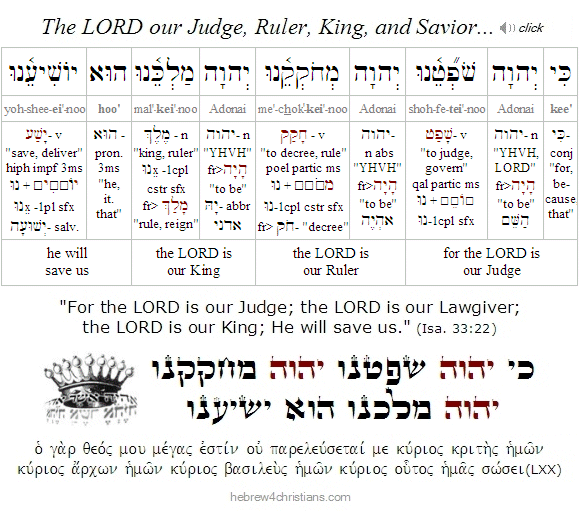
The Spirit of Truth (רוח האמת)
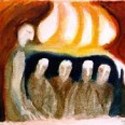
06.05.19 (Sivan 2, 5779) "The Spirit of the Lord GOD is upon me, for the LORD has anointed me to bring good news to the poor; he has sent me to bind up the brokenhearted, to proclaim liberty to the captives, and the opening of the prison to those who are bound" (Isa. 61:1). The Spirit of the Lord GOD (רוּחַ אֲדנָי יְהוִה) heralds "good news" and therefore centers on the glory of the Messiah (see John 15:26; John 16:13-14). The root meaning of the Hebrew verb basar (בָּשַׂר) is "to bring tidings, especially pertaining to military encounters," and hence both the Septuagint (and the New Testament) renders it as "εὐαγγελίσασθαι" - "to proclaim the victory [of God's redemption]." Interestingly, the word basar can also mean "meat" or "flesh," whereas besorah means "good tidings." Perhaps the connection between the two words has to do with the proclamation of a feast during times of "good news" after a significant military victory. In the New Testament, the connection between the flesh of Messiah offered in sacrifice for our sins should also be noted, especially since the "good news" concerns deliverance from the devil and the sickness of spiritual (i.e., eternal) death.
Something radically changed with the advent of the Holy Spirit, friends. Something inward, as the Torah was written upon the tablets of the heart, as it was written: "Behold, the days are coming, declares the LORD, when I will make a new covenant (i.e., brit chadashah: בְּרִית חֲדָשָׁה) with the house of Israel and the house of Judah, not like the covenant that I made with their fathers on the day when I took them by the hand to bring them out of the land of Egypt, my covenant that they broke, though I was their husband, declares the LORD. For this is the covenant that I will make with the house of Israel after those days, declares the LORD: I will give my Torah within them (נָתַתִּי אֶת־תּוֹרָתִי בְּקִרְבָּם) and will engrave it on their hearts (וְעַל־לִבָּם אֶכְתֲּבֶנָּה). And I will be their God, and they shall be my people" (Jer. 31:31-33). Note especially that this covenant would not be "like the covenant I made with the fathers" during the time of the Exodus from Egypt (i.e., Sinai), but it would be something far greater, regenerating human nature, when the truth of Torah would become part of the inner life and passion of the heart. Amen. The LORD is not only "God-with-us" but "God-within-us."
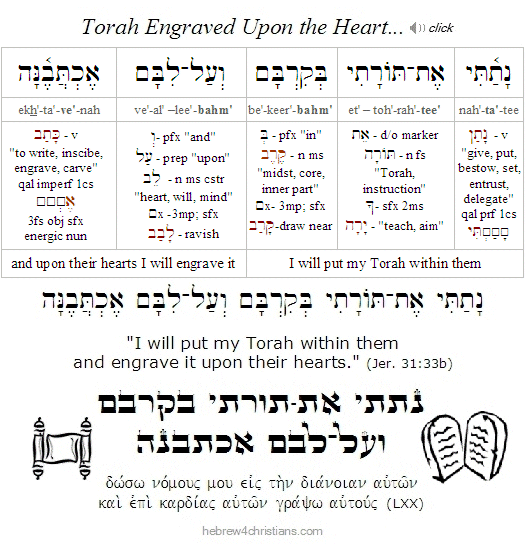 |
 |
Heeding the Call of Hope...
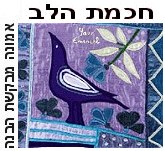
06.05.19 (Sivan 2, 5779) The only way out of the painful ambiguity of life is to hear a message from the higher world, the Heavenly Voice, that brings hope to our aching and troubled hearts: "Faith comes by hearing the word of Messiah - ῥῆμα Χριστοῦ" (Rom. 10:17). And yet what is the meaning of this message if it is not that all shall be made well by heaven's hand? There is hope, there is hope, and all your fears will one day be cast into outer darkness, swallowed up by God's unending comfort... "Go into all the world and make students (תַּלְמִידִים) of all nations" (Matt 28:19), and that means sharing the hope that what makes us sick - our depravity and despair - has been healed by Yeshua, and that we escape the gravity of our own fallenness if we accept his invitation to receive life in him. "For it is you who light my lamp; the LORD my God outshines my darkness."
כִּי־אַתָּה תָּאִיר נֵרִי
יְהוָה אֱלהַי יַגִּיהַּ חָשְׁכִּי
kee · a·tah · ta·eer · nei·ree
Adonai · E·loh·hai · ya·gee'·ah · chosh·kee

"For it is you who light my lamp;
the LORD my God will outshine my darkness."
(Psalm 18:28)

Hebrew Study Card
Exercising faith means actively listening to the Eternal Voice, the Word of the LORD that calls out in love in search of your heart's trust... To have faith means justifying God's faith in you, that is, understanding that you are worthy of salvation, that you truly matter to God, and that the Voice calls out your name, too.... Living in faith means consciously accepting that you are accepted by God's love and grace. Trusting God means that you bear ambiguity, heartache, and darkness, yet you still allow hope to enlighten your way.
The Rizhiner Rebbe once said, "Let your light penetrate the darkness until the darkness itself becomes the light and there is no longer a division between the two. As it is written, "And there was evening and there was morning, one day." Yea, the darkness and the light are both alike unto Thee, O LORD, as it is written: "If I say, "Surely the darkness shall cover me, and the light about me be night, even the darkness is not dark to you; the night is bright as the day, for darkness is as light with you" (Psalm 139:11-12).
"To have faith is to perceive the wonder that is here, and to be stirred by the desire to integrate the self into the holy order of being. Faith does not spring out of nothing. It comes with the discovery of the holy dimension of our existence. Faith means to hold small things great, to take light matters seriously, to distinguish between the common and the passing from the aspect of the lasting. It is from faith from which we draw the sweetness of life, the taste of the sacred, the joy of the imperishably dear. It is faith that offers us a share in eternity." - Abraham Heschel (Prayer: 1953)
"There is a state of religious experience that I will call cosmic religious feeling. It is very difficult to explain this feeling to anyone who is entirely without it, especially as there is no anthropomorphic conception of God corresponding to it. The individual feels the nothingness of human desires and aims and the sublimity and marvelous order that reveal themselves both in nature and in the world of thought ... and looks upon individual existence as a sort of prison and wants to experience the universe as a significant whole." - Albert Einstein (Religion and Science)
"Now faith is the substance (ὑπόστασις) of things hoped for, the argument (ἔλεγχος) from things not seen" (Heb. 11:1). "People [who deny the reality of God] suppress the truth in unrighteousness, because what can be known about God shines (φανερός) within them, for God has illuminated the truth within them. For the invisible things (τα ἀόρατα) of God's power and glory from the creation of the world are clearly seen (καθοράω) and are understood by human beings he has made, so they are without excuse" (Rom. 1:18-20). Such are those who do not receive the "love of the truth" (τὴν ἀγάπην τῆς ἀληθείας) and so be saved (2 Thess. 2:10). Therefore "we look not to the things that are seen but to the things that are unseen. For the things that are seen are transient, but the things that are unseen are eternal" (2 Cor. 4:18).
Therefore we "walk by faith, not by sight," as if the invisible is indeed visible. We must stay strong and keep hope, for through hope we are saved (Rom. 8:24). Faith is the "argument" (ἔλεγχος) from things unseen (Heb. 11:1). Do not be seduced by mere appearances; do not allow yourself to be bewitched into thinking that this world should ever be your home. No, we are strangers and pilgrims here; we are on the journey to the reach "the City of Living God, to heavenly Jerusalem, to the assembly of the firstborn who are enrolled in heaven" (Heb. 12:22-23). Therefore do not lose heart. Keep to the narrow path. Set your affections on things above since your real life is "hidden with God" (Col. 3:1-4). Do not yield to the temptation of despair. Look beyond the "giants of the land" and reckon them as already fallen. Keep pressing on. Chazak, chazak, ve-nit chazek - "Be strong, be strong, and let us be strengthened!" Fight the good fight of the faith. May the LORD our God help you take hold of the eternal life to which you were called (1 Tim. 6:12).
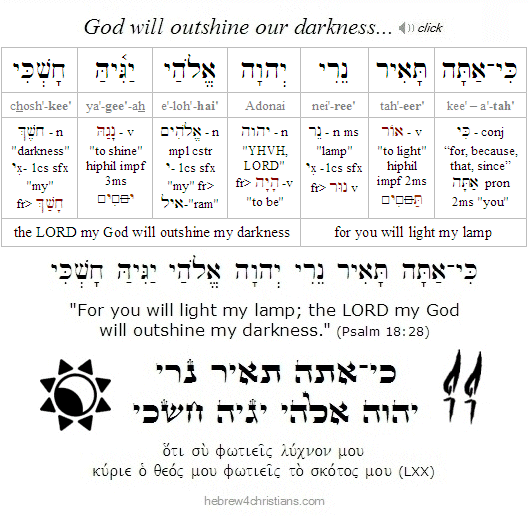 |
 |
Foundation Stone of Reality...

06.04.19 (Sivan 1, 5779) Followers of Yeshua no longer find their identity in this world but rather through their spiritual union with their ascended LORD (Gal. 2:20; 6:14; Eph. 1:3; 2:6)... Therefore we are instructed to "seek the things that are above (τὰ ἄνω ζητεῖτε) where the Messiah is seated at the right hand of God; focus your thoughts on the things above - not on things here on earth - for you have died, and your life has been hidden (κέκρυπται) with Messiah in God. When the Messiah, who is your life, appears, you too will appear with him in glory" (Col. 3:1-4). It is a spiritual decision to "seek first the kingdom of God" (Matt. 6:33), which means that we must attach ourselves to God, esteeming the unseen and the eternal as more real than the seen and the temporal (2 Cor. 4:18). Turn away from worldly news and gossip; these affairs are empty, vain, and devoid of ultimate significance and instead consciously redirect your thoughts toward heaven. Understand that you belong to God and that your true home is in the world to come. Affirm this truth over and over until it becomes a part of your daily soul... Put away from you the "old nature" – all those labels and judgments that used to define you - and open your heart to the radiance and peace of God instead (Col. 3:15). As it is written: "You will keep in perfect peace (שָׁלוֹם שָׁלוֹם) the one who leans on you, because he trusts in you. Trust in the LORD forever and ever, for Yah the LORD (יָהּ יְהוָה) is everlasting strength" (Isa. 26:3-4):
יֵצֶר סָמוּךְ תִּצּר שָׁלוֹם שָׁלוֹם
כִּי בְךָ בָּטוּחַ
בִּטְחוּ בַיהוָה עֲדֵי־עַד
כִּי בְּיָהּ יְהוָה צוּר עוֹלָמִים
yei·tzer · sa·mookh · tee·tzohr · sha·lom · sha·lom
kee · ve·kha · ba·too·akh
beet·khu · vadonai · ah·dey-ad
kee · be·Yah · Adonai · tzoor · oh·lah·meem

"You will keep in perfect peace the one who leans you,
because he trusts in you. Trust in the LORD forever,
for in Yah the LORD is everlasting strength." (Isa. 26:3-4)


The Month of Revelation...

[ Today marks the start of the month of Sivan, which means that Shavuot begins in six days... ]
06.04.19 (Sivan 1, 5779) Today is Rosh Chodesh Sivan, which means that the countdown from Passover to the climactic 50th day of Shavuot (i.e., "Weeks" or "Pentecost") is nearly complete. The great Torah sage Moses Maimonides once wrote: "The counting from Passover to Shavuot is carried out as one who waits for the coming of the human being he loves best, counting the days and hours." If the Passover redemption is incomplete without the giving of the Torah at Sinai, how much more is redemption given by the Messiah, the true Lamb of God, incomplete without the advent of the Spirit? The cross leads to the revelation of "deeper Torah," imbued by the inward power of the Holy Spirit that quickens our hearts to long for the coming of our Beloved Savior and the establishment of his kingdom over all the earth...
Just as the giving of the Torah happened at one specified time, but the receiving of it happens all the time, "in every generation," the same may be said regarding the ruach, the Spirit: every day we must open our hearts to the Divine Presence... "I need Thee every hour." The study of Torah never ends, since we are never without need for the Teacher. Chodesh Tov be'shem Yeshua, dear talmidim!
 |
Ashamed of the Gospel?

06.04.19 (Sivan 1, 5779) Some of you may know how I have had constant trouble using Facebook, Twitter, and Google over the last few years, but recently matters have become more serious... In response to a question as to whether my posts were being censored by these social media giants, someone tweeted me to say that he thinks I am being banned and troubled because of the word "Christian" that appears in the name of this ministry. Now let me just say (to any of you who may likewise have wondered such a thing) that I am happy to use the name "Christian" and hold no shame in doing so. I am not ashamed of the message of the gospel and I stand with my fellow believers in Messiah around the world -- many of whom have suffered greatly because of the name of Christ. Please, I am a linguist and philosopher and understand the semantics and also the translation issues regarding the word "Christ," "Jesus," and so on, but I nevertheless refuse to be priggish or snobby -- or worse, cowardly -- by refusing to identify with my fellow believers in Yeshua... If I am persecuted for the name of "Christ," so be it. God will take care of me, friends -- and he will take care of you too! We are more than conquerors! Our faith overcomes this world. Shalom!
 |
I am with you always...
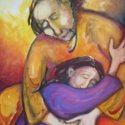
06.04.19 (Sivan 1, 5779) The great Name of the LORD is "I-WILL-BE-WITH-YOU-ALWAYS" (אני אהיה עמך תמיד), which implies that we always live within God's Presence and care (Deut. 31:8, Josh. 1:9, Isa 41:10, Matt. 28:20; etc.). The Name YHVH (יהוה) signifies God's indomitable love and unfailing compassion. The LORD says to the trusting heart, hen al kapayim hachotikh: "Behold I have engraved you on the palms of my hands" (הֵן עַל־כַּפַּיִם חַקּתִיךְ; Isa. 49:16). Remember the One who stretched out his hands and died for your healing; remember that he said, "Don't be anxious about tomorrow, for tomorrow will be anxious for itself. Sufficient for the day is its own trouble." Again, "do not be anxious for any reason, but in everything by prayer and supplication with thanksgiving let your requests be made known to God, and the peace of God (שלום יהוה), which surpasses all understanding, will guard your hearts and your minds in Yeshua the Messiah" (Phil. 4:6-7). God keeps in perfect peace (lit. "the peace of peace") those whose lean on Him (Isa. 26:3).
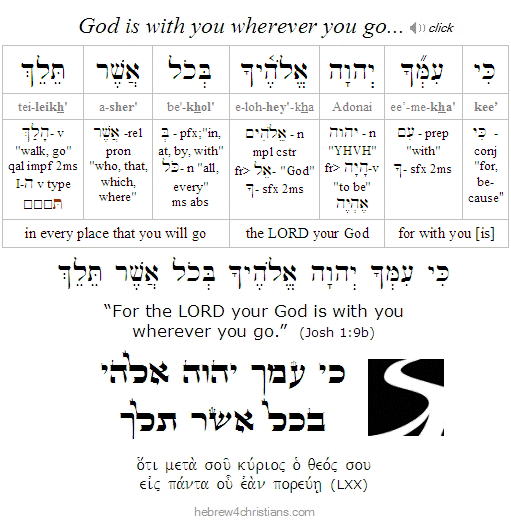 |
 |
Awakening to Revelation...

06.04.19 (Sivan 1, 5779) After making kiddush and enjoying the holiday meal on the evening of Shavuot, it is a Jewish tradition to stay up all night reciting various selections from Torah until sunrise. This custom is called tikkun leil ha'shavu'ot: תיקון ליל השבועות, the "Rectification for Shavuot Night," and the vigil was instituted by the sages as a "remedy" for Israel's failure to be awake on the morning of the revelation (the midrash rebukes those who overslept on the morning of the revelation for needing to be roused to salute the King). Philosophically considered, the theme of "wakefulness" (עֵרוּת) is central to revelation, for without it we lose our consciousness as God's people. We must understand our history to order our lives according to the truth. The God of our Salvation, the Redeemer of our people, the LORD YHVH, must be distinguished from the gods of the nations; the covenant we have with God must retain its sanctity; there is a real testimony and direction to our lives. Salvation does not mean being "absorbed" into some sort of nirvana or unconsciousness, but instead focuses on concreteness, historical events, our heritage, our future, and the story of our lives...
It is important to understand that the Torah is received in words, which require a sequence of time and logic to form intelligible connections and unity of understanding. Faith comes by hearing the message of God (Rom. 10:17), not by seeing the miraculous or experiencing the "numinous." As Moses later said of the Sinai revelation, "You saw no matter of form" (Deut. 4:15) indicating priority of the inner witness of truth over outer appearance. Even the visions of the prophets held no authority until God revealed the meaning.
Shavuot is about mattan Torah, the "giving of the Torah," and therefore it reminds us of our duty to "stay awake" to receive its message. Torah, as of course you know, does not mean "law" but rather "direction" or "teaching," and studying Torah therefore involves personal response, commitment, and intense focus. It is not "book learning" more than it is a type of "holy listening," heeding the story of our redemption and discovering its application and goal for our lives. Hearing the "Song" of God's Truth, is more important than the intellectual "seeing" of classical Greek tradition. Hearing is connected with time and not to timeless forms or Ideas of reality; it is dynamic and "intrudes" upon the moment to be witnessed. That is part of the reason the Sinai revelation was attended with shofar blasts and thunder: to awaken the heart to arise and the mind to hear... Torah study, then, implies a complex dialog or discourse ranging over the centuries, stretching back to the time of Moses (and through him, to Adam), through the establishment of the network of judges (Exod. 18:13-26), through the words of the prophets of Israel, all leading to the life of Yeshua the Messiah and the message he gave to his disciples... Our faith, then, is rooted and bound up with history, with the fathers and mothers who went before us, with the lives of scribes, the sages, the prophets, the apostles, including the ongoing dialog of the people of God over the millennia.
Shavuot has no specific ritual observance for us today other than to be awake to revelation, consciously remembering the truth of our heritage and holding steadfast to the promises of our ultimate healing. The very first commandment of the Ten Commandments begins: anochi Adonai Elohekha (אָנכִי יְהוָה אֱלהֶיךָ), "I am the LORD your God who brought you out of the land of Egypt" (Exod. 20:2). The very first commandment, then, is faith in the message of God's love and blessing. Torah study (understood in its broadest sense) is therefore of primary importance, because faith in its truth is the precondition of all that follows. The basic commandment of Shavuot, then, is the mitzvah that precedes all the other mitzvot, namely, to wake up and believe the miracle of God is for you....
 |
In light of this, ask yourself whether you need to understand before you will believe... The Midrash Rabbah says that God offered the Torah to each of the 70 nations, but each nation first asked to understand what was required of them, and then rejected the offer... Finally God approached Israel and asked: "Will you accept my Torah?" And they replied, kol asher dibber Adonai na'aseh (כל אשׁר־דבר יהוה נעשׂה), "all that the LORD has spoken we will do" (Exod. 19:8). In other words, Israel was willing to accept the Torah even before they understood what was required of them. Later they reaffirmed their simplicity of heart by saying na'aseh ve'nishma (נעשה ונשמע) "We will do and then we will understand" (Exod. 24:7). Praise the LORD God of Israel: You don't have to work to receive the light - it comes to you as you are, requiring only that you open your eyes to behold it... God is the inner radiance of reality; by his light we are able to see light (1 John 1:5; Psalm 36:9).
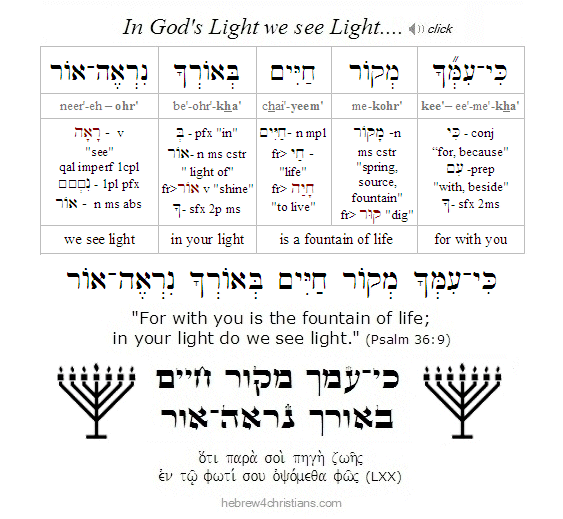 |
 |
Sound of Silence...

[ Our Torah reading for this week is called Bamidbar, a word formed from "ba-" (in the) and "midbar" (desert). Midbar is related to dibber, to speak, from the root davar (לְדַבֵּר)... ]
06.03.19 (Iyyar 29, 5779) The Hebrew word midbar ("desert") shares the same root as davar (דּבר) which means "word." We often need to be alone to hear God speaking kol demamah dakkah (קוֹל דְּמָמָה דַקָּה) - "the sound of a low whisper" (1 Kings. 19:12), and the journey into the desert was God's way of separating His people to speak with them "privately," so to speak (Jer. 2:2). But to hear the word we must humble ourselves, and the desert (i.e., "word") of Sinai is therefore first of all the word of humility (עֲנָוָה). When God spoke Torah to Israel, it was from a nondescript mountain - a place of emptiness, brokenness and need. Indeed, another word for Sinai is "chorev" (חרֵב), a word that means dryness and desolation. That is the starting point -- not the lush places of a future paradise. We receive Torah "bamidbar" because we can only hear God's davar in a place of lowliness and inner quiet. God brings us to an arid place -- inhospitable, and dangerous -- to reveal our need for Him, to show Himself as our Sustainer. The way to Sinai is a necessary excursion to prepare us to look for the greater hope of Zion. May God help us heed the whisper of His Spirit...
 |
Lessons in Waste Places...
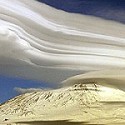
[ The following is related to our Torah reading for this week, parashat Bamidbar... ]
06.03.19 (Iyyar 29, 5779) How much energy is wasted going backward, returning to the same empty places? Yet we are creatures of habit; we tend to be lazy and we avoid examining our convictions and underlying assumptions; we are apt to ignore or explain way evidence that might challenge us, or - if we can no longer avoid the truth - we procrastinate and later "forget" the resolve to turn our heart to God in the truth. This way we can "hear" a commandment and yet postpone our action until later; we can agree to follow Messiah, but only in our own terms. Like Augustine, we pray: "Grant me chastity and continence -- only not yet..." And so we are turned back to emptiness because we refuse to go forward.
"We like to continue to believe what we have been accustomed to accept as true, and the resentment aroused when doubt is cast upon any of our assumptions leads us to seek every manner of excuse for clinging to them. The result is that most of our so-called reasoning consists in finding arguments for going on believing as we already do." - James Harvey Robinson (1863-1936)
Between bondage and the promised land lies the desert - a transitional place where we learn to depend on God's sustenance alone to bring us through... The "desert experience" can help liberate the soul from its past slavery, or it can reveal that the soul really does not want to be free. Hardship and testing reveal to us what we really believe, after all. It's one thing to be set free from what has once enslaved you, but it is quite another thing to live as a free person, conscious of your own liberty and dignity as a beloved child of God. And yet we are warned that if we don't turn away from what has enslaved us in the first place, if we don't learn to truly see ourselves as a new creation (בְּרִיאָה חֲדָשָׁה), it is likely we will be led back to a place of slavery once again.
Be encouraged, friends. If you feel lost in the desert, remember that it was there that God revealed himself to broken Moses... As it is written, "Who among you fears the LORD and obeys the voice of his servant? Let him who walks in darkness and has no light trust in the name of the LORD and rely on his God" (Isa. 50:10). Yeshua is our Good Shepherd who promises to guide our way to the high country of Zion (Psalm 23; John 10:14-16).
 |
Advent of the Spirit... (חג השבועות)
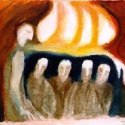
06.03.19 (Iyyar 29, 5779) Saturday, June 8th (at sundown) marks the end of the 49 days of counting the omer, and therefore the following day is the "Jubilee" of Shavuot (i.e., "Weeks" or "Pentecost"). Recall that the Torah instructed (Lev. 23:15-16) that we count from the day following Passover (i.e., Nisan 16) for exactly 49 days or seven weeks, until Sivan 5 (i.e., from April 10th until June 7th this year). On the 50th day of the counting (i.e., Sivan 6), a formal celebration was to be observed to recall the giving of the Torah to God's people - first at Sinai, and later, among Yeshua's disciples at Zion (Acts 2:1-4).
 |
According to the sages, the festival of Shavuot marks the culmination of the experience of redemption, sometimes called Atzeret Pesach (עֲצֶרֶת פֶּסַח), or the "conclusion" of Passover. Since the Exodus from Egypt was intended to lead to the revelation given at Sinai, the goal of Passover was the giving of the Torah to the Jewish people. In other words, the LORD took the Jews out of Egypt so that they would be His own treasured people, holy and separated from the pagan cultures around them, living in the light of great revelation. Indeed, all of the holidays of the biblical calendar are connected with this event, including the fall festivals of Rosh Hashanah, Yom Kippur and Sukkot.
During this time, it is customary for young adults to recommit themselves to Talmud Torah (the study of Torah) and to renew their decision to live as faithful Jews. In addition to formal "confirmation ceremonies" observed at synagogues, some other Shavuot customs include decorating the home and synagogue with greenery, eating dairy foods and sweets (as samples of the "milk and honey" of the promised land), and staying up the entire night of Shavuot to read selections from the Torah and from the Talmud (this custom is called tikkun leil shavu'ot: תִּקּוּן לֵיל שָׁבוּעוֹת, "Rectification for Shavuot Night"). For the Messianic Jew, Shavuot is the time of celebrating the birth of kallat Mashiach - the Bride of the Messiah (or the new covenant assembly), since the Ruach HaKodesh (Holy Spirit) was poured out to the believers in Yeshua during this festival (Acts 2:1-4).
 |
At the synagogue, it is customary to start the Shavuot evening service later than usual, to ensure that the 50th day has arrived (see "counting the omer"). As mentioned above, many people stay at the synagogue throughout the entire night listening to poems and favorite portions of Scripture, or reading from a special book (tikkun leil Shavuot) that includes key verses of each Torah portion, passages of each tractate of the Mishnah and from the Zohar. This custom is observed to "repair" the night of Shavuot from the error of sleeping so soundly before the Torah was revealed at Sinai that God had to awaken the Jews with piercing shofar blasts, thunder, and lightning the following morning.
Shavuot Torah Readings:
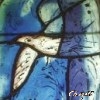
- Erev Shavuot (evening of Sat. June 8th to sunrise)
Tikkun Leil Shavuot: Reading assorted passages of Torah, Talmud, etc.
- Shavuot Day 1 (Sun. June 9th)
Torah: Exod. 19:1-20:23; Num. 28:26-31 (M)
Haftarah: Ezek. 1:1-28; 3:12; Scroll of Ruth (K)
New Testament: John 1:32-34; Mt 3:11-17; Acts 2:1-21, 37-41
- Shavuot Day 2 (Mon. June 10th)
Torah: Deut. 14:22-16:17 Num. 28:26-31 (M)
Haftarah: Habakkuk 3:1-19; Scroll of Ruth (K)
New Testament: Acts 2:1-13
The Culimination of Passover
Jewish tradition teaches be'chol dor vador - that in every generation each person should consider him or herself as having personally received the revlation of Torah at Mount Sinai. The climax of the Shavuot morning service is the recitation of the famous Akdamut poem followed by the reading of the Ten Commandments, when all the congregation stands to "relive" the experience at Sinai. A second Torah scroll is then taken out of the ark and the portion is read (Num. 28:26-31) that describes the sacrificial offerings made at the Temple during Shavuot, and the Haftarah (Ezek. 1:1-28; 3:12) concerns the amazing revelation of God in the form of the Throne/Chariot.
The Scroll of Ruth (מגילת רות) - a beautiful story about God's redemptive love - is traditionally read on the second day of Shavuot. As the Goel (kinsman-redeemer), Boaz was a wealthy man of the tribe of Judah (Bethlehem) who married a Gentile bride. Boaz's name means "in Him is strength," a picture of the Yeshua the Messiah, his greater Descendant, who also redeemed for himself a bride from among the nations. Among traditional Jews, the Book of Ruth is is read since the events recounted took place during the time of the spring harvest (linking it to the agricultural aspect of Shavuot), and Ruth is a picture of willing acceptance of a Jewish lifestyle (linking it to the events of Sinai).
The holiday of Shavuot is one of the shelosh regalim (three major "pilgrimage festivals") commanded in the Torah (Exod. 23:14-17; Deut. 16:16) and therefore it reveals profound spiritual truth for followers of Yeshua (Luke 24:44; 2 Tim. 3:16). God did not want us to miss the significance of this holiday, since it expresses the freedom and truth of the New Covenant of Zion. From my family to you: Shavuot Sameach - "Happy Shavuot!" May this be a time of renewal and great joy in your lives....
 |
The Month of Sivan (חודש סיון)
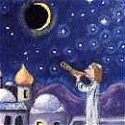
[ The month of Sivan begins on Monday, June 3rd at sundown this year... ]
06.02.19 (Iyyar 28, 5779) The third month of the Jewish calendar (counting from Nisan) is called Sivan (סִיוָן), which usually begins during late May or early June (this year, Mon. June 3rd). In the Torah this month is simply called "the third month" (i.e., chodesh ha-shlishi: חדֶשׁ הַשְּׁלִישִׁי), though some time after the Babylonian Captivity it assumed its present name. Sivan is mentioned only once in the Jewish Scriptures, in the Book of Esther (Esther 8:9).
Since Sivan always has 30 full days, Rosh Chodesh Sivan (i.e., the celebration of the new month) is observed for only one day. The rabbis call the second day of Sivan is called "yom hameyuchat" (the "day of distinction"), since on this day the people agreed to accept the Torah, and upon thier ratification Moses instructed the people to prepare themselves to become "a kingdom of priests and a holy nation" (Exod. 19:6-8). In some circles this "day of distinction" is celebrated as a minor festival. On the third day of month the LORD instructed Moses to "set a boundary" (hagbalah) for the people around the mountain in preparation for the coming revelation to be given "three days later" (Exod. 19:9-15). These three days are called the "Three Days of Separation" (i.e., Sheloshet Yemei Hagbalah: שְׁלשֶׁת יְמֵי הַגְּבָּלָה) to prepare for the revelation on Sivan 6th: "Make yourselves ready by the third day" (Exod. 19:11,15). The Talmud comments: "Blessed be our God who has given a threefold Torah (Torah, Prophets, Writings) to a threefold nation (Kohanim, Levites, and Israelites) through one who was third (Moses, the third child after Aaron and Miriam) in the third month."
The first five days of the month of Sivan anticipate the day that the Torah was revealed to Israel at Sinai, namely, on the sixth of Sivan, a date which the rabbis later connected with the holiday of Shavuot ("Weeks" or "Pentecost"), which occured exactly seven weeks after the Exodus from Egypt. As mentioned above, on the night before Shavuot itself it is customary to read selections from the entire Torah throughout until sunrise. This custom is called tikkun leil shavu'ot: תִּקּוּן לֵיל שָׁבוּעוֹת, "Rectification for Shavuot Night," and was instituted as a "remedy" for Israel's failure to be awake on the morning of the revelation (the midrash scolds the Jewish people for sleeping the night before they received the Torah, and that is why God had to sound a shofar blast and bring thunder and lightning to wake them up). Spiritually speaking, then, the month of Sivan represents the giving of the Torah to Israel (i.e., z'man mattan Toratenu: זְמַן מַתַּן תּוֹרָתֵינוּ), when the drama which began with the Exodus from Egypt culminated with the giving of the Torah. For Messianic believers, the month of Sivan also commemorates the giving of the Ruach Ha-Kodesh (Holy Spirit) to the followers of Yeshua after His ascension into heaven.
The commandment to sanctify the new moon of Sivan reveals that it is our responsibility to sanctify (i.e., observe) Biblical time in general. In other words, when we observe the month in which the Torah was revealed to Israel, we are acknowledging that time itself is rooted in the Biblical calendar with its divinely inspired cycle of festivals (i.e., the moedim). Since Rosh Chodesh Sivan historically marks the beginning of a month of great revelation, we humbly ask the LORD to help us prepare for the coming season of Shavuot (i.e., "Pentecost"):
יְהִי רָצוֹן מִלְּפָנֵיךָ יהוה אֱלהֵינוּ
וֵאלהֵי אֲבוֹתֵינוּ שֶׁתְּחַדֵּשׁ עָלֵינוּ חדֶשׁ טוֹב
בַּאֲדנֵינוּ יֵשׁוּעַ הַמָּשִׁיחַ, אָמֵן
ye·hee · rah·tzohn · meel·fah·ney·kha · Adonai · E·lo·hey·noo
vei·loh·hey · a·voh·tey·noo · she·te·kha·deish · ah·ley·noo · khoh·desh · tohv
ba'a·doh·ney·noo · Ye·shoo·a · ha·mah·shee·akh · a·mein

"May it be Your will, LORD our God and God of our fathers,
that you renew for us a good month
in our Lord Yeshua the Messiah. Amen."

Download Study Card
Parashat Bamidbar (פרשת במדבר)

[ Our Torah reading for this week, parashat Bamidbar, is always read before the great holiday of Shavuot (i.e., "Pentecost")... ]
06.02.19 (Iyyar 28, 5779) We have a busy week ahead of us. First, we start reading the fourth book of the Torah, namely Sefer Bamidbar, or the "Book of Numbers." Next, the month of Sivan begins Monday after sundown, which heralds the conclusion of the 49 day countdown from the day following Passover (see Lev. 23:15-16). The first five days of the month of Sivan anticipate the day the Torah was given to Israel at Sinai, namely, the sixth of Sivan, which marks exactly seven weeks after the Exodus from Egypt. So I will be posting things related to both the Torah portion for this week as well as the holiday of Shavuot, which begins just after the Sabbath this week (i.e., Sat. June 8th after sundown). May the LORD show us grace as we study his Torah and to review the significance of the Torah written upon our hearts in the Messiah (Jer. 31:31, Heb. 10:16, Jer. 32:40). Amen.
Our Torah portion for this week, parashat Bamidbar (פרשת במדבר), begins the Book of Numbers (ספר במדבר), where the narrative begins precisely where the Book of Exodus left off, that is, with the glory of the LORD hovering over the Mishkan (Tabernacle) as the Israelites were stationed at Sinai (Exod. 40:38, Num. 1:1). On the first day of the thirteenth month following the Exodus from Egypt – exactly thirty days after the Tabernacle was first consecrated – God commanded Moses to take a census of all Israelite males over 20 years of age who would bear arms. Moses and the heads of each tribe recorded the results, with 603,550 men in all. This number did not include the Levites, however, since they were designated to take care of the Tabernacle and its furnishings during the journeys.
God then gave instructions about how the Israelite camp was to be arranged. The Tabernacle would occupy the central location, with three clans of the Levites surrounding it on the north, south, and west (Moses and Aaron's tents were placed before the entrance on the east). The twelve other tribes were divided into four groups of three, each of which had its own flag and tribal leader's tent. All of the tents of the Israelites were to face the Tabernacle on every side. This camp formation was to be strictly maintained while traveling throughout the desert.
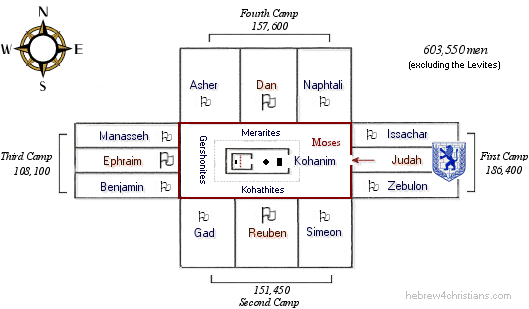 |
Each tribe had its own prince (i.e., nassi: נשׂיא) and its own unique flag (i.e., degel: דגל) and each tribe's flag color corresponded with the color of its respective stone in Aaron's breastplate (Exod. 28:15-21). For example, Judah's stone was a sky-blue carbuncle and therefore the color of his flag was like the color of the sky with a "fiery lion" embroidered upon it (see Gen. 49:9).
Led by the Shekhinah (שכינה) cloud by day and the pillar of fire by night, at first the Israelites were en route to the Promised Land - the land of Canaan - which the LORD swore to give to Abraham and his descendants forever. However, the people later rebelled (i.e., their complicity in the "Sin of the Spies") and were therefore condemned to wander for 40 years in the desert. This 40 year period is often thought of as a time of punishment, though it was also a time of refinement for the nation, and it was during this time that God demonstrated great love for Israel by feeding the people with manna, giving them water from rock (i.e., the so-called Well of Miriam), protecting them with the Clouds of Glory, instructing them through the teaching of Moses, and so on. God loves his people -- even when they are faithless -- and his punishments are ultimately healing and redemptive.
|




































































